Rolex Submariner Buying Guide
When looking to buy a Rolex Submariner there are a number of great choices. When considering a Rolex Submariner, you'll find a variety of excellent options with different sizes, dial colors, metal types, and more. The brand updates their catalog often, so check back when you need the most up to date current information and values for 2025.
Current Rolex Model Numbers for 2025
The 2023 Submariner references are available in 41mm, an increase in size from the traditional 40mm. These included the following model numbers:
- 124060
- 126610LN
- 126610LV
- 126613LB
- 126613LN
- 126618LB
- 126618LN
- 126619LB
The recent surge in interest in high-end watches, both new and used, has definitely affected the market for vintage Rolex timepieces. Should you invest in a used Rolex and, if so, is there one reference or type that is a better choice than another?
It is difficult to make any definitive statements about Rolex watches because there are so many types and styles to choose from. What speaks to one person may leave another cold. However, there are certain vintage Rolex watches that have stood the test of time and have influenced a vast number of purchasers. One of these is the classic Rolex Submariner - the archetype of the modern dive watch.
Even among the Rolex's portfolio of legendary models, the Submariner still stands out as arguably the most famous of them all. The luxury dive watch against which all others are judged, the Rolex Submariner has been the 'inspiration for' (read: extensively copied by) scores of competing manufacturers, and it has served as the blueprint for underwater timepieces for well over half a century.
In order to understand the value of the Rolex Submariner and why so many people choose to invest in this vintage watch, it may be helpful to sketch in a little of the background on this classic timepiece. With this information, you may be better prepared to purchase a Rolex Submariner and to choose the right model for your particular taste and style.
Table of Contents
- History
- First Dive Watch
- From Tool Watch to Status Symbol
- Rolex Submariner in the Modern Era
- 2020 Submariner Updates
- New vs Used
- Rolex Submariner References Price Range
- References
The History of the Rolex Submariner
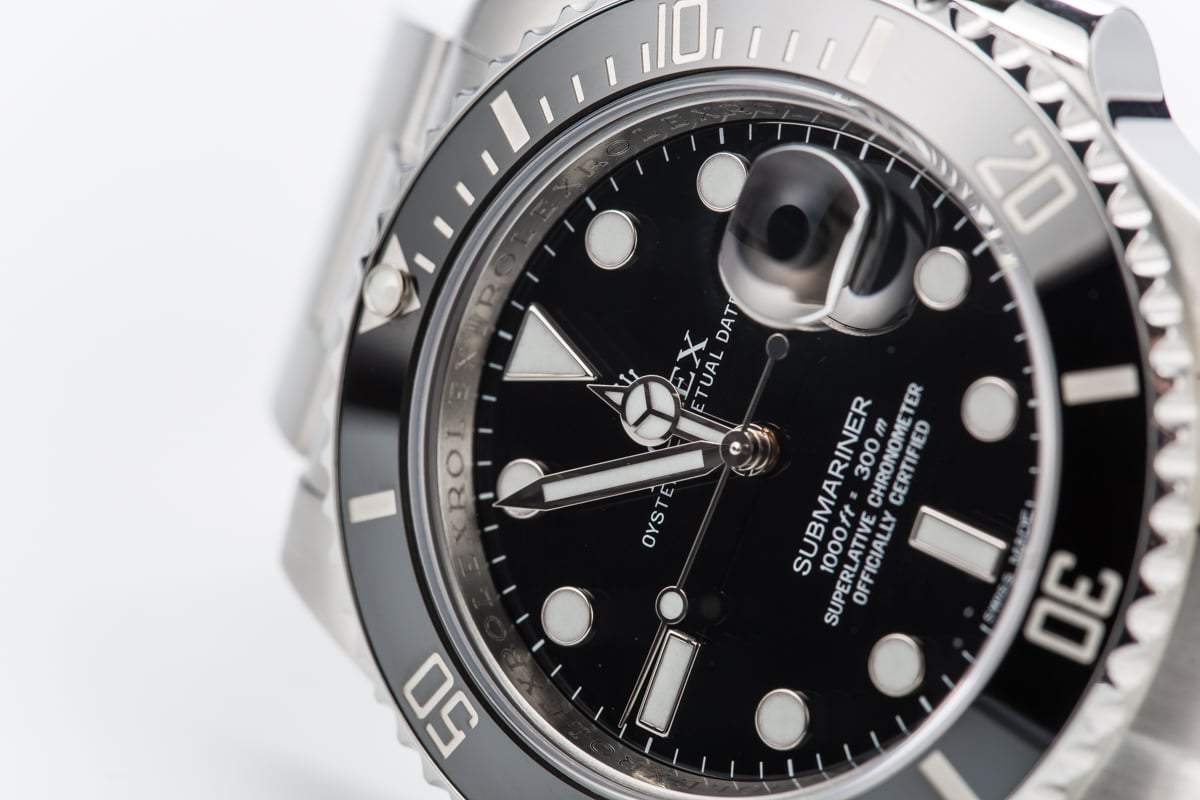
The 1950s was a decade where Rolex could do virtually no wrong. In quick succession, they brought us the Turn-O-Graph, the Explorer, the GMT-Master, the Milgauss, and the Day-Date – all names to get any watch collector's heart racing. However, undoubtedly Rolex's greatest triumph came along in 1953 when it developed the first Submariner.
Like all of Rolex’s early sports watches, the Submariner was created to help solve a problem. The sport of recreational Scuba diving was still in its infancy, but its popularity was soaring – helped immeasurably by the creation of the Aqua-Lung, invented by two men, Émile Gagnan and Jacques-Yves Cousteau (yes, that Jacques Cousteau). The celebrated underwater explorer, conservationist, and filmmaker also happened to be a close friend of Rolex’s Public Relations Director, Rene-Paul Jeanneret, who was also a passionate diver.
Jeanneret was the driving force behind Rolex’s adoption of the tool watch concept, the notion that a wristwatch could be used for more than simply telling the time and that it could, in fact, also be a far more useful implement with added functionality. Under Jeanneret’s guidance, and coupled with Cousteau’s invaluable real-world input, the very first Submariner model, the ref. 6204, was born.
The Rolex Submariner is the product of decades of precise technological refinement. The rich Submariner history of this timepiece makes it an interesting watch that collectors have fallen in love with. The Rolex Submariner evolved from earlier efforts to make a watch that was truly water-resistant. Rolex experts worked for many years to perfect the submersible features of this watch, and the original Submariner debuted at the 1954 Swiss Watch Fair. The "Submariner" name is in keeping with the minimalist Rolex nomenclature found with the DateJust and other models.
The Rolex Submariner is known for its resistance to water and was the first watch ever designed for deep sea diving. Submersible up to 980 feet or 300 meters, the Rolex Submariner far outperformed the earlier "waterproof" watch models whose maximum sustained water resistance only went to 200 meters or 660 feet of pressure. This incredible resistance to water pressure meant that deep-sea divers could wear the Rolex Submariner on all but the very deepest dives.
The First Dive Watches
If you read up enough about the early life of the Rolex Submariner, you could be forgiven for thinking it was the very first dive watch ever made; it wasn't. Depending on your point of view, that distinction could go to the Omega Marine from 1932, or possibly the Radiomir from Panerai established during WWII (which, confusingly, was largely manufactured by Rolex).
However, the Blancpain Fifty Fathoms is what most people consider to be the first modern dive watch, and it was released a matter of months before the Rolex Submariner. The Fifty Fathoms was the model to pioneer the use of a unidirectional rotating timing bezel to allow divers to accurately track their immersion times. It also had a high contrast black dial with white hands and indexes, a self-winding movement so the crown would need to be used as seldom as possible, and (of course) a highly water-resistant case. Many of those elements made it onto the Submariner as well, with Rolex being the architects of not only the first practical automatic caliber (the Perpetual) but also the first serially-produced, water-resistant housing: the Oyster Case.
Although the Sub may have missed out on being crowned the world's very first dive watch, it was the first to achieve a water-resistance rating of 100m (for those wondering, 50 fathoms is equal to about 91.44m). Interestingly though, the one thing the Submariner couldn't have was a bezel that only turned in one direction. The patent for that idea remained with Blancpain right up until 1983, meaning that every generation of the Role Submariner produced before then had a bezel that turned both ways.
Why is that important? If a unidirectional bezel is knocked and accidentally moved on a dive, it can only display a longer underwater time. That means the wearer will overestimate rather than underestimate immersion time, and in situations that require decompression stops, this can be a make-it-or-break-it factor that helps prevent divers from suffering the effects of decompression sickness (also known as "the bends").
A Decade of Improvements
As with many of Rolex's releases during the 'Golden Age' of sports watches from the 1950s, the early life of the Submariner was especially turbulent. That debut reference, the ref. 6204, went public at the 1954 Basel Fair and was an immediate success. However, Rolex also launched two other versions almost simultaneously, the ref. 6200 and ref. 6205. There is some dispute over which model actually came first, with it all happening over such a short period and such a long time ago (and the fact that the reference numbers are clearly not sequential). However, careful examination of the serial numbers confirms that the first to market was indeed the ref. 6204.
Looking at the watch today (and we will explore each individual reference in more detail a little later) all of the fundamentals are there, although possibly without the finesse of the modern watches. We have a black rotating bezel, but the graduations are missing the small hash marks for the first 15-minutes. Similarly, the bezel ring itself has a coin-style edging instead of being serrated, and the hands are the slim pencil kind rather than the Mercedes-style type. The cases are also notable by their smaller case diameters and the absence of crown-guards.
All of those changes would resolve themselves over the next six or seven years, with the Submariner undergoing an almost continuous process of modification, both external and internal. By the end of the 1950s, the watch was into its ninth reference - that one being the ref. 5512. This was the model that cemented the Rolex Submariner's outward appearance for roughly the next 50-years.
The ref. 5512 from 1959 has just about everything we would look for on the current Submariner. Its case had grown to 40mm, up from the 37mm to 38mm of earlier pieces. Crown-guards were added, and the bezel now slightly overhung the side of the case to make it easier to turn. (We have the British Ministry of Defence to thank for that, which we'll also cover later). For the most part, the overall design of the Rolex Submariner was set for a while and the ref. 5512 would stay in production until the end of the 1970s. Its identical sibling (which was non-chronometer-rated, and therefore less expensive), the ref. 5513 remained in production even longer, not retiring from the catalog until about 1990.
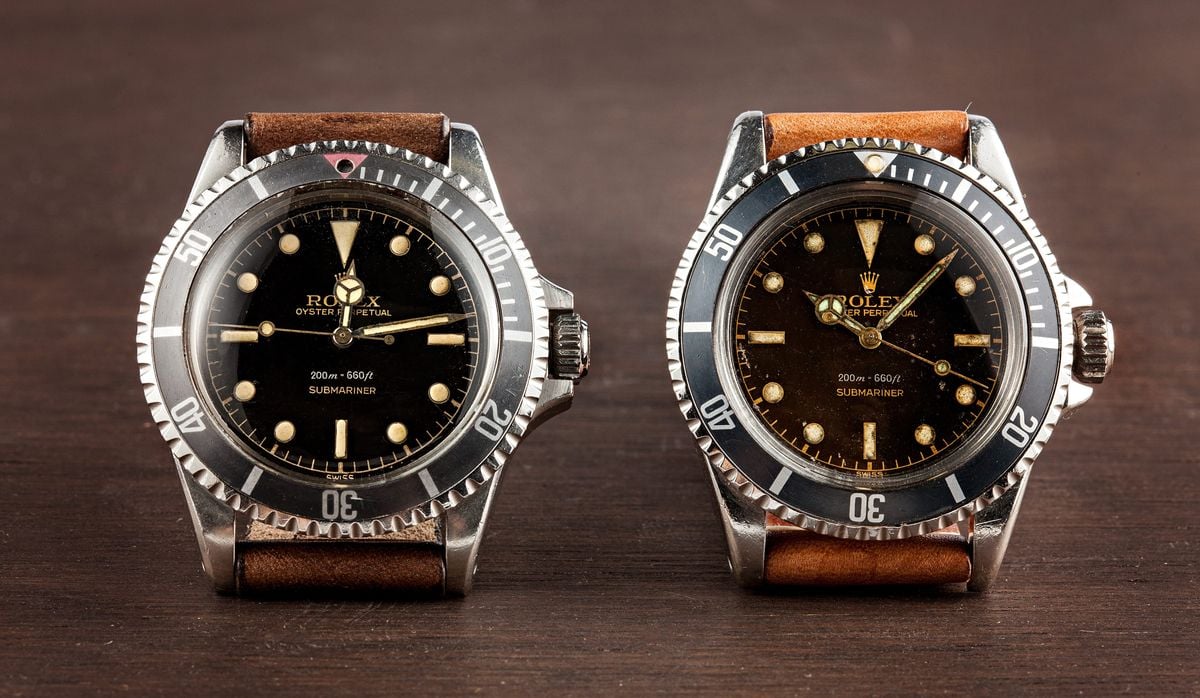
From Tool Watch to Status Symbol
In 1969, the Rolex Submariner went through the most significant change in its then-16-year history. The addition of a date function on the ref. 1680, although a relatively minor change in the grand scale of things, marked the point where the Sub stopped being an outright tool watch and began to take the very first steps in its transition towards becoming a status symbol.
The addition of a date-displaying model was a move that split opinion. Purists protested, arguing that it not only ruined the clean symmetry of the dial, particularly with the Cyclops lens on the crystal, but that it was also an unnecessary inclusion on a dive watch in the first place. Who needed to know what day it was when they were 50ft underwater anyway?
The more pragmatic fans welcomed it, reasoning that the Submariner was increasingly being worn for both diving purposes and as an everyday watch, and a date function significantly expanded its practicality for daily wear and use. Rolex was clearly on the latter’s side (even though the brand produces both a date and no-date versions), given that it is only the date-displaying models that have been released in various solid gold and Rolesor configurations (along with some extravagant color schemes), further solidifying its luxury watch reputation. The non-date variants have only ever been crafted from stainless steel, and fitted with nothing but black dials and bezels.
Rolex Submariner in the Modern Era
Date or no-date, there was nothing to dent the Rolex Submariner's popularity. The four-digit references gave way to the five-digit models in the early 80s, bringing new and improved movements, sapphire crystals, and increasing the water resistance from 200m to 300m.
In 2003, the Submariner reached its 50th anniversary, now set firmly in its position as the world's favorite dive watch. To celebrate, Rolex released the ref. 16610LV, a stainless steel date-displaying model with a bright green bezel. Although the Sub had been given splashes of color before - a blue dial and bezel had been available since 1971 on the gold ref. 1680/8, and on a Rolesor variant since 1983 with the ref. 16803 - this marked the first time that green (Rolex's official company color) had made it onto their landmark dive watch.
Green is a color long associated with the Rolex brand, and it recognizably forms the backbone of practically all of Rolex's marketing. However, the ref. 16610LV, nicknamed the Kermit, was slow to catch on with members of the general public. Nevertheless, it was eventually seen as a quirky take on the traditional favorite and its acceptance grew - just in time for it to be discontinued.
It gave way in 2010, as did the rest of the ref. 1661x range (the no-date models didn't actually retire until 2012) to the new six-digit series. These brought about as significant a shakeup to the underlying form of the Rolex Submariner as there had been since the ref. 5512 appeared with crown guards. The ref. 11661x generation (and ref. 114060 no-date) went some way in answering the call of many Rolex fans to make the Submariner bigger. With modern trends favoring larger watches, there were grumblings from some that a 40mm case was simply too small for a modern sports model. Rolex compromised by keeping the same dimensions on paper, but introducing the 'Super Case' design, which featured lugs and crown guards almost twice the width of earlier examples, lending the watch a more squat and bulky appearance.
Much like the date function, the Super Case divided fans. Some missed the elegant sweeping lines of previous models, while others enjoyed the increased wrist presence. In addition to that upgrade, Rolex also added its recently introduced Cerachrom bezel; made from a fade-proof, scratchproof, and incredibly hardwearing ceramic material designed to stay looking brand-new for decades. Here again, the traditionalists lamented the loss of the aluminum inserts, the ones which picked up knocks and scrapes over the years, giving each watch a unique character.
However, the Rolex Submariner continued to be a massively sought-after watch, and among the modern references, arguably no version is more coveted than the Kermit's direct replacement: the Hulk. The ref. 116610LV included a green dial as well as a green Cerachrom bezel, and working together on the latest muscular case, these features quickly earned it the unofficial "Hulk" nickname.
Submariner Updates
The Rolex Submariner went through another major change with the most recent releases. The release of the ref. 12661x series (ref. 124060 for the no-date) finally and at long last legitimately increased the size of the watch... by about 1mm. The new 41mm references also saw a softening of the Super Case and a return to more flowing lines and a wider, more proportional bracelet. The Kermit is also back (stainless steel case, green bezel, black dial) along with a model that features a blue bezel and a black dial crafted from solid 18k white gold.
More importantly, the movement has been updated too. The Cal. 3135, which served with distinction for more than 30-years (an incredible span for a Rolex movement) has been replaced by the next-generation Cal. 3235. Containing nearly 90% new parts, including a proprietary escapement dubbed the Chronergy, it is recognized as among the finest mass-produced calibers of its type ever made. The No-Date model saw a movement upgrade from the Cal. 3130 to the Cal. 3230, offering similar upgrades as the date-displaying models, but just in a date-free format.
All told, there are eight models in the latest Submariner range: three in stainless steel, three in 18k gold, and two in Rolesor. It may be old enough now to collect its pension, but the Rolex Submariner is still the definitive luxury dive watch, constantly a best-seller even among its iconic stablemates and in many ways, the only watch you will ever need.
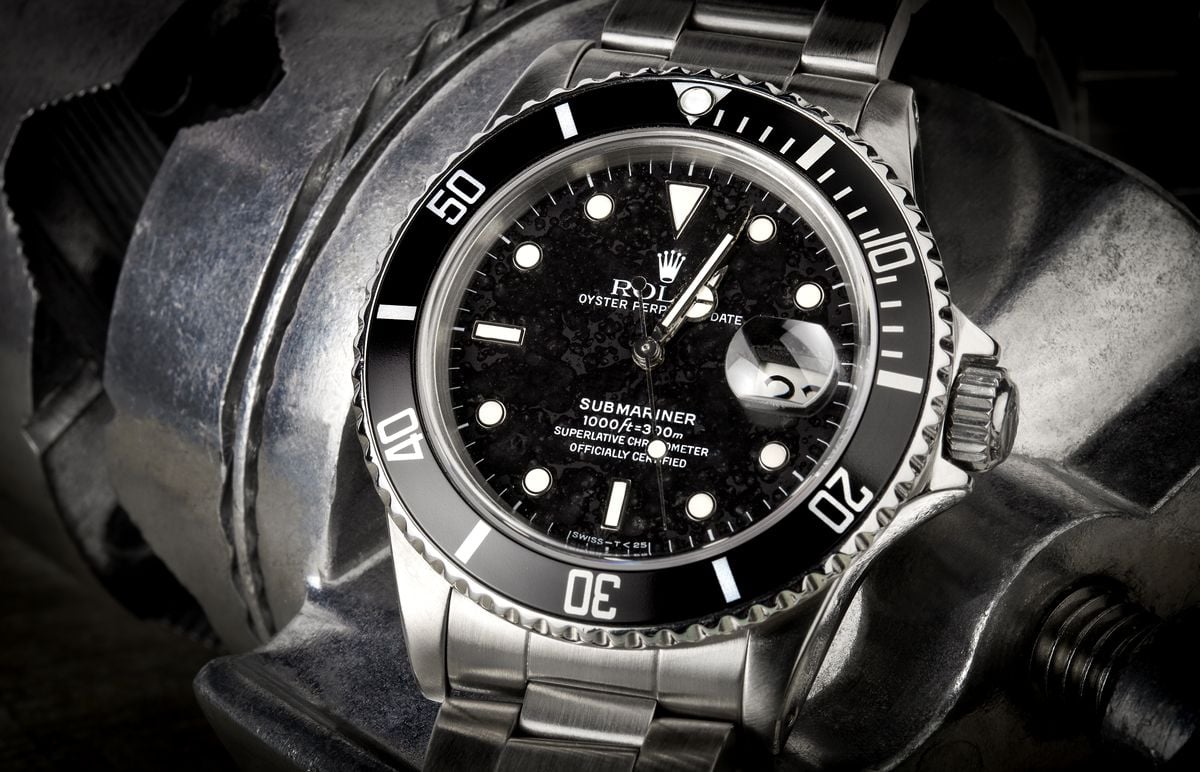
How Much is a Rolex Submariner?
If you fancy picking yourself up a brand-new Rolex Submariner, and who could blame you, how much are you going to have to part with? Below is a quick rundown of the current price list:
- Ref. 124060 - (Steel Submariner No-Date) — $9,100
- Ref. 126610LN - (Steel Submariner Date; Black bezel) — $10,250
- Ref. 126610LV - (Steel Submariner Date; Green bezel) — $10,800
- Ref. 126613LB - (Two-tone Submariner Date; Blue dial/bezel) — $15,600
- Ref. 126613LN - (Two-tone Submariner Date; Black dial/bezel) — $15,600
- Ref. 126618LN - (Yellow gold Submariner Date; Black dial/bezel) — $39,000
- Ref. 126698LB - (White gold Submariner Date; Black dial/blue bezel) — $42,000
You might think it's unbelievable that you can pick up a stainless steel Rolex sports watch with a legacy like one offered by the Submariner for as little as $8,100. And unfortunately, you’d be right. The chances of you being able to wander into a Rolex retailer and come out with a new ref. 124060 on your wrist are practically zero unless you already have a longstanding relationship with the dealer and are a very good customer.
It is just the way of things with the brand at the moment. They have based their reputation in the modern era on notions of exclusivity, and Rolex keeps to their same production schedule, regardless of how much the demand for certain models increases. That policy has also seen the rise in popularity of the pre-owned market, which is now (more-or-less) the only place you can buy many of the latest and most desirable Rolex watches - but at a price. A quick search tells us that the least you will be paying for what is technically be paying above Rolex retail prices, simply because there are so few examples available for immediate purchase. For those looking to sell Rolex watches from their collection, there are a number of desirable models in demand. 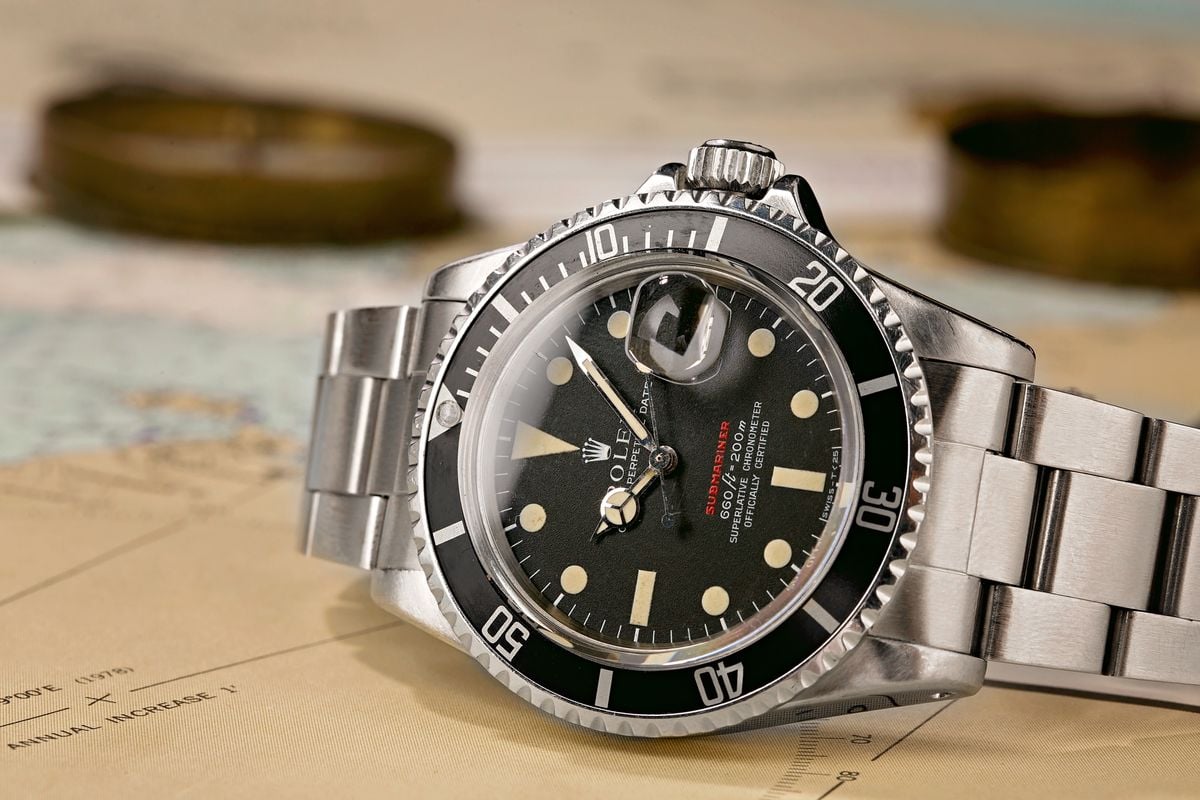
Buying New Versus Pre-Owned
So if buying brand-new is going to be either extremely difficult or extremely expensive, what about going through the pre-owned market? There's no doubt that older Submariner models can be bought here as comparative bargains, with even a steel model from the just-retired series, the ref. 116610LN, coming in at around the $10,000 price point. However, as you will undoubtedly already have worked out, a model with a history as long and illustrious as the Sub is going to have a vast scope in terms of prices, from the surprisingly affordable to the utterly unbelievable.
Certainly, the least expensive examples are to be found among the five-digit ref. 1161x family, in either steel or two-tone Rolesor, which ran from the late 80s all the way up to 2010. The reason they sit at the most accessible point in the Submariner hierarchy is really down to rarity. They were produced in the heady days when Rolex watches were more readily available (at the start of their run anyway) before widespread shortages at the retail level became a global phenomenon. These Submariner models were also, in real terms, less expensive than their modern-day equivalents. That has ultimately led to a pre-owned market with ample options, with prices starting at just under the $8,000.
At the other end of the spectrum, it is really a question of how much you would like to spend. The sky truly is the limit when it comes to rare and collectible vintage references, and examples such as the Big Crown ref. 6538 (otherwise known as the James Bond) easily topped a quarter of a million dollars in some cases. Elsewhere, the ref. 5514 was only made in tiny numbers as a private commission piece and fitted with the first Helium Escape Valves soon to make their way onto the Sea-Dweller. There's also the ref. 5517, produced exclusively for the British Special Forces and referred to as one of the Milsubs (see the 'Special References' section below). Both of those models are also far into six-figure territory. Below, we have listed each vintage reference of the Rolex Submariner, together with their price ranges.
Rolex Submariner References Price Range
- Ref. 6204 - $50,000-$100,000
- Ref. 6205 - $50,000-$80,000
- Ref. 6200 - $150,000-$500,000+
- Ref. 6536 - $25,000-$120,000
- Ref. 6536/1 - $25,000-$120,000
- Ref. 6538 - $80,000-$250,000+
- Ref. 5510 - $30,000-$120,000
- Ref. 5508 - $20,000-$60,000
- Ref. 5512 - $15,000-$50,000
- Ref. 5513 - $8,500-$100,000+
- Ref. 5514 - $50,000-$100,000+
- Ref. 5517 - $200,000+
- Ref. 1680 - $15,000-$100,000
- Ref. 1680/8 - $20,000-$90,000
- Ref. 16800 - $7,000-$40,000
- Ref. 16803 - $8,500-$20,000
- Ref. 16808 - $15,000-$45,000
- Ref. 168000 - $9,000-$20,000
- Ref. 16610 - $7,500-$25,000+
- Ref. 16610LV - $12,000-$50,000+
- Ref. 16613 - $8,000-$20,000
- Ref. 16618 - $20,000-$100,000+
Cerachrom Bezel Models
- Ref. 116610LN - (Black bezel) - $10,000-$20,000
- Ref. 116610LV - (Green bezel) - $18,000-$30,000+
- Ref. 116618LN - (Gold/Black dial & bezel) - $30,000-$50,000
- Ref. 116618LB - (Gold/Blue dial & bezel) - $30,000-$50,000
- Ref. 116613LN - (Rolesor/Black dial & bezel) - $11,000-$30,000
- Ref. 116613LB - (Rolesor/Blue dial & bezel) - $13,000-$35,000
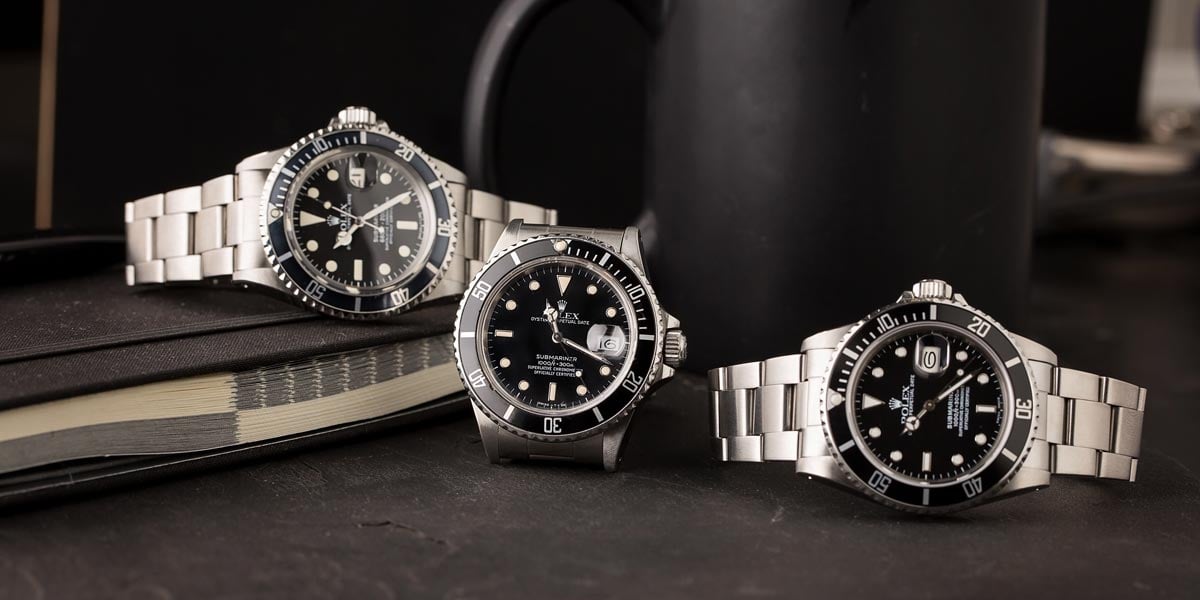
Rolex Submariner References
As you can see, there have been many different references of the Rolex Submariner that have been produced over the last six decades or so. Some were here and gone in a relative blink of an eye, while others remained in the catalog for a long time. Below we take a closer look at each Rolex Submariner reference.
Rolex Submariner ref. 6204 (Estimated Pre-owned Price: $80,000-$150,000)
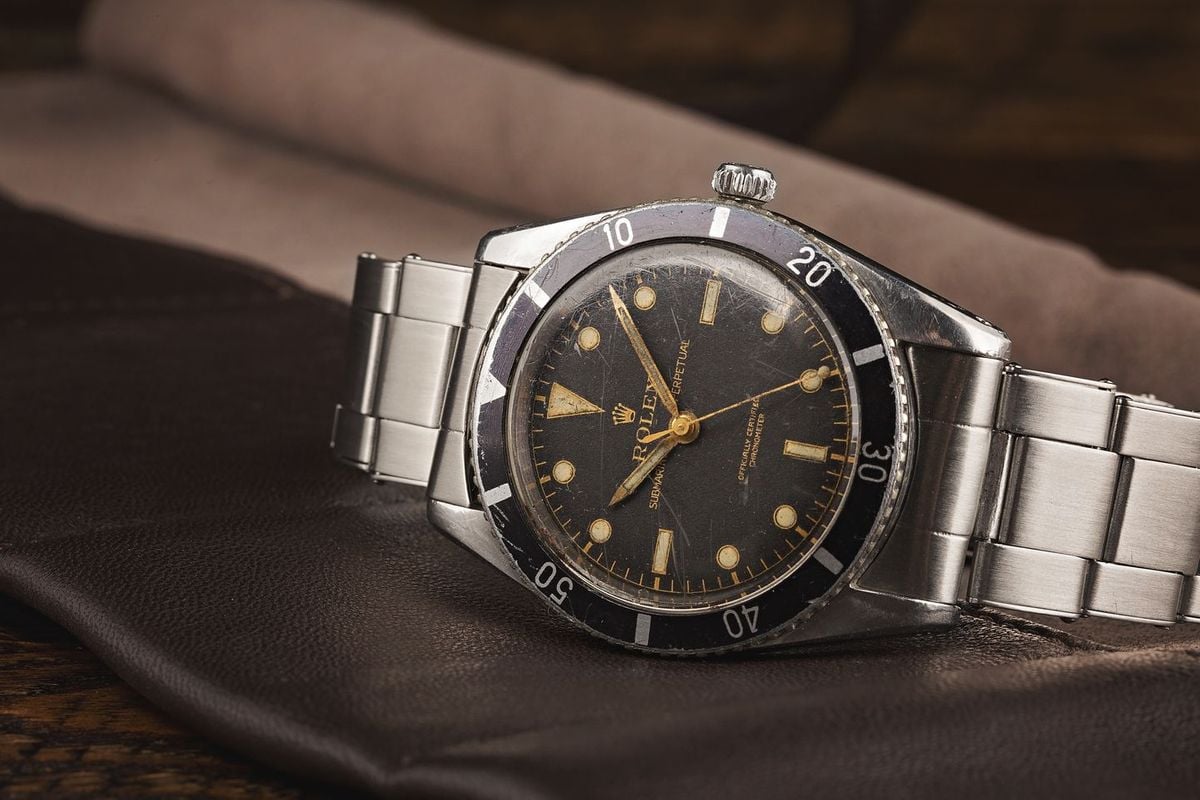
- Production Years (approx): 1953
- Case Diameter: 37mm
- Materials: Stainless Steel
- Dial: Black; Gilt Gloss or Honeycomb
- Movement: A260 (18,000vph)
- Water Resistance: 100m
This is where it all started. The ref. 6204 is the first-ever Rolex Submariner, officially announced in 1953 and available to buy the following year. Even after all this time, it is still very recognizably the Submariner dive watch we all know and love, although there are definite differences from the modern-day examples. Most immediately evident are the lack of crown guards and the especially thin case. The crown is also noticeably small, at 5.3mm.
However, all the main aesthetic elements are still there. The dot and baton indexes, with the inverted triangle at 12 o'clock have remained to this day, as have the strongly contrasting black on white detailing on both the dial and bezel. Only the pencil-style hands seem out of place. The movement is the A260 which had been powering some of Rolex's early Oyster Perpetual models and was chosen for its toughness and shock resistance. Most models wore the 'Submariner' text on their dials, although there are incredibly rare versions renamed the 'Sub-Aqua' and distributed to the U.K. market.
Rolex Submariner ref. 6205 (Estimated Pre-owned Price: $80,000-$100,000)
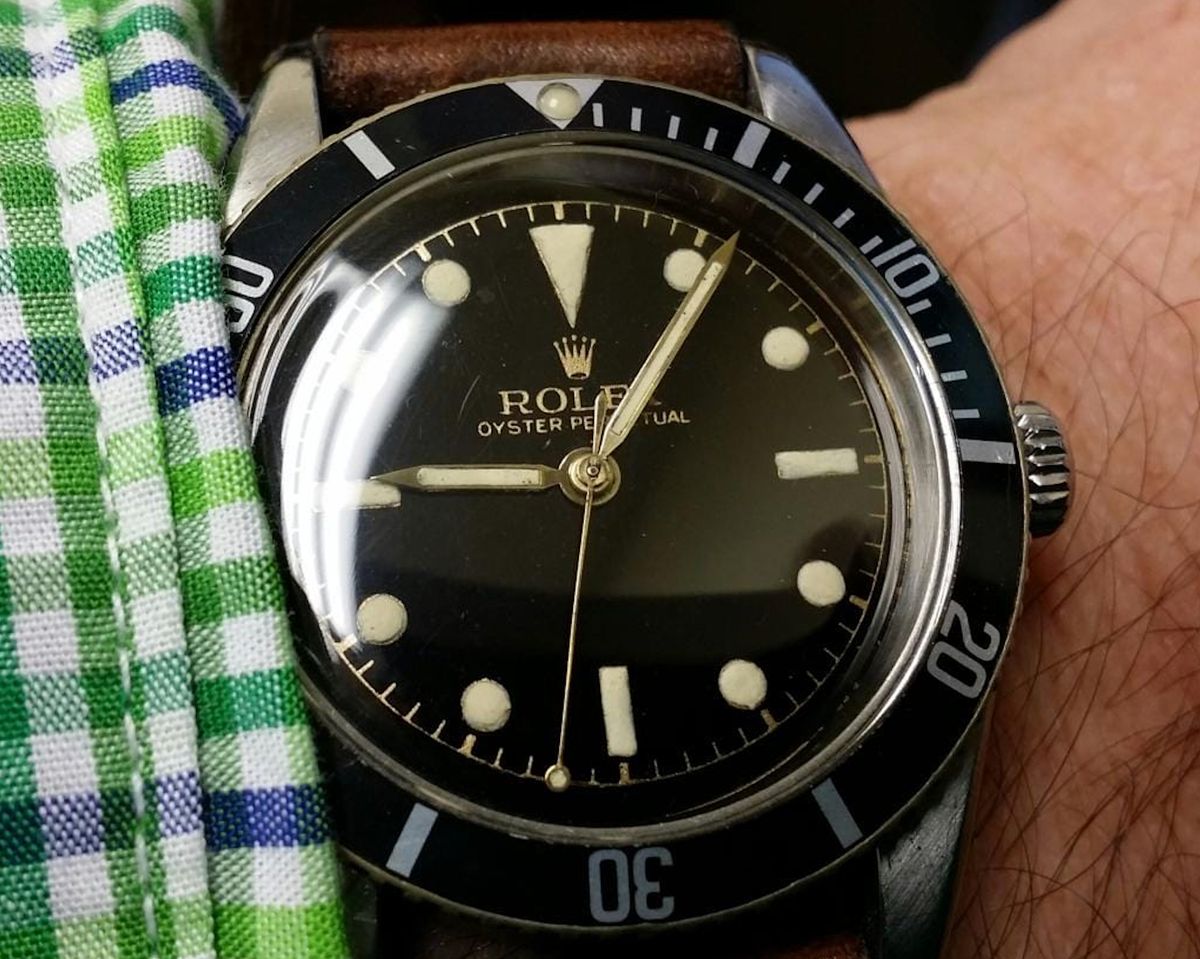
- Production Years (approx): 1954
- Case Diameter: 37mm
- Materials: Stainless Steel
- Dial: Black; Gilt Gloss
- Movement: A260 (18,000vph)
- Water Resistance: 100m
Released within months of the ref. 6204, the ref. 6205 is virtually identical with the exception of a couple of improvements. Firstly, the case has been thickened slightly and the crown is now 6mm. Water-resistance is still 100m and the movement is the same too.
Although only in production for about a year or so, it was enough time for a couple of variations to come through. The earliest examples actually removed the 'Submariner' name from the dial, resulting in what are known as 'clean dial Subs,' with 'Rolex' and 'Oyster Perpetual' being the only text. As with the debut reference, there's no depth rating or chronometer-certification script yet. Similarly, while the first run pieces retained the pencil-style hour and minute hands and lollipop seconds hand of the ref. 6204, later in the year they were swapped for the Mercedes-style hands we now associate with the Submariner.
Rolex Submariner ref. 6200 (Estimated Pre-owned Price: $150,000-$500,000)
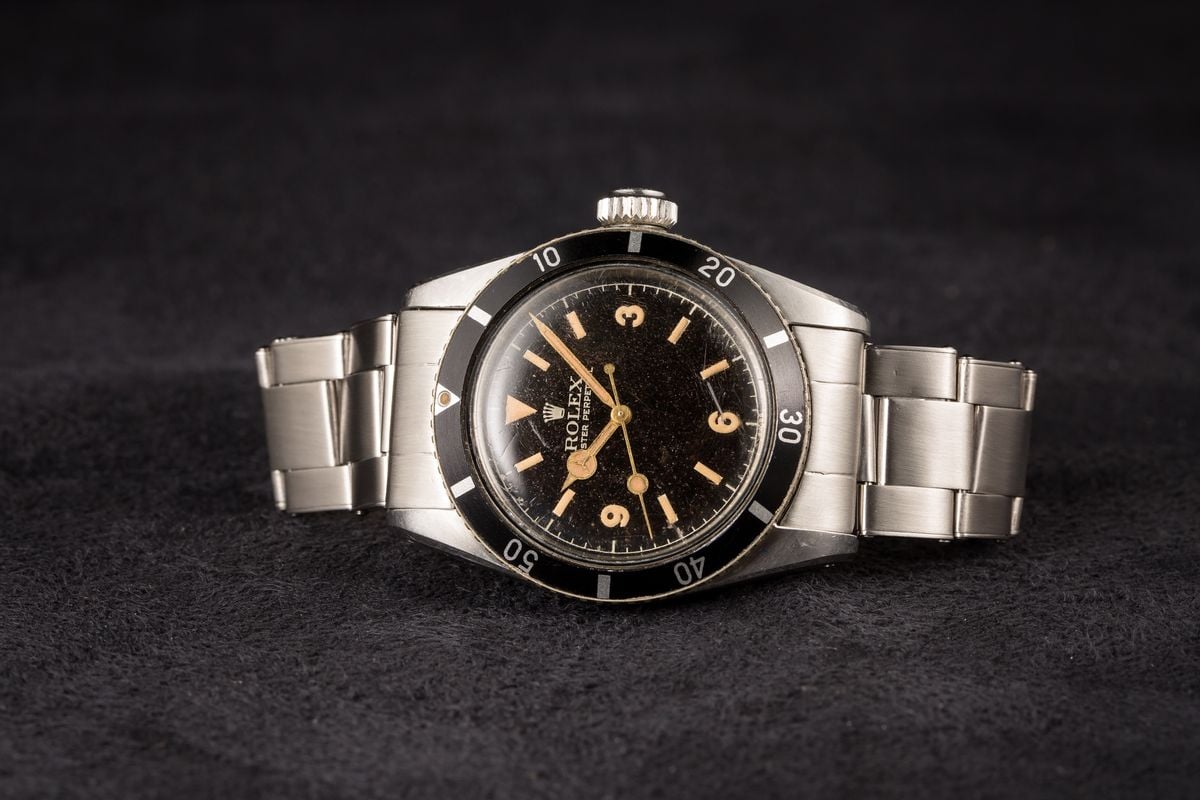
- Production Years (approx): 1955-1956
- Case Diameter: 38mm
- Materials: Stainless Steel
- Dial: Black; Gilt Gloss
- Movement: A296 (18,000vph)
- Water Resistance: 200m
The absolute grail for many Submariner fanatics (who have nicknamed it the King Sub) is the ref. 6200 - the first of the so-called "Big Crown" models. The winding crown on this reference is a full 8mm, and together with a case, which had been thickened again, it helped achieve an increased depth rating of 200m. However, the biggest news here is the dial. There were two variants issued: one with a small Rolex logo, the other large, but both types had the 3/6/9 Arabic numerals more associated with the Rolex Explorer - an extremely unusual occurrence on a Submariner.
The other key change was inside, with the Cal. A296 taking the place of the Cal. A260. Both movements were more or less the same, but the new caliber was physically larger and so was a better fit for the case. Fantastically scarce, only around 300 or so are thought to have been built and they are among the most expensive Submariner models on the market.
Rolex Submariner ref. 6536 & 6536/1 (Estimated Pre-owned Price: $30,000-$150,000)
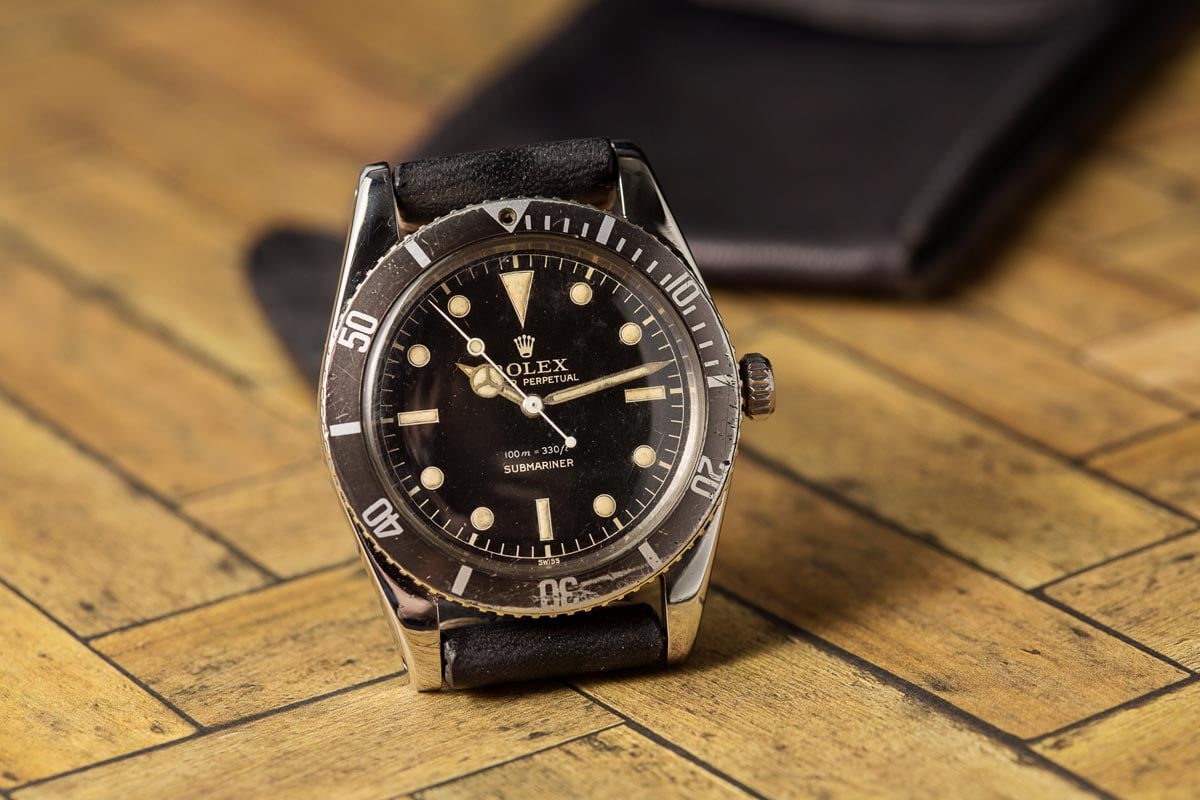
- Production Years (approx): 1955-1959 (ref. 6536); 1957-1960 (ref. 6536/1)
- Case Diameter: 38mm
- Materials: Stainless Steel
- Dial: Black; Gilt Gloss
- Movement: Cal. 1030 (18,000vph)
- Water Resistance: 100m
Beginning production at the same time as the ref. 6200, the Submariner ref. 6536 returned to a thinner case and smaller crown (and 100m water resistance) but was given the Cal. 1030, the first time the watch had featured a caliber with bidirectional winding. An impressive movement that would go on to be used in more than two dozen different Rolex models, it could be had in either chronometer or non-chronometer-rated versions. The ref. 6536/1 Submariner starting in 1957 used the former, hence the difference in its reference number.
This is also the first of the '4-line' Subs, with a depth rating now included on the dial, as well as (on later versions) hash marks on the bezel for the first 15-minutes. One interesting note; the ref. 6536 used the case and case back of the ref. 6538 (below) and you will often see that reference number scratched out and ref. 6536 engraved underneath.
Rolex Submariner ref. 6538 (Estimated Pre-owned Price: $80,000-$300,000)
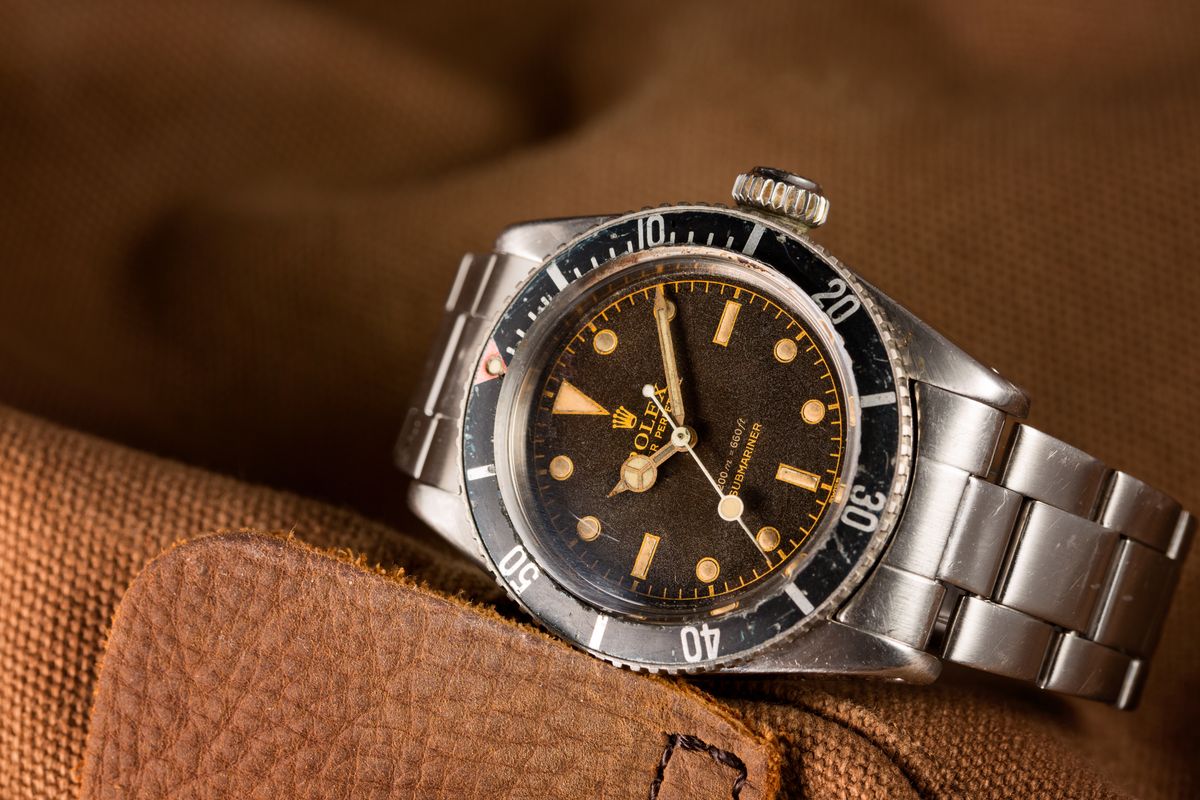
- Production Years (approx): 1956-1959
- Case Diameter: 38mm
- Materials: Stainless Steel
- Dial: Black; Gilt Gloss
- Movement: Cal. 1030 (18,000vph)
- Water Resistance: 200m
Where would the Submariner be without James Bond? When Agent 007 went about settling Dr. No’s hash in 1962, he did so with the Submariner ref. 6538 on his wrist. Another massively coveted vintage reference, the ref. 6538 has a real presence, a thicker, heavier watch than previous models, and with the reappearance of the 8mm crown and 200m water resistance.
Like the ref. 6536 above, it was available in either chronometer and non-chronometer variants, but this was the first time the COSC watches actually had the 'Officially Certified Chronometer' text on the dial. Forever known as the original 'Bond Sub' and an absolute legend in the industry, the ref. 6538 also holds the record for most expensive Submariner ever sold at auction, when a model with an Explorer dial went for $1,068,500 in 2018.
Rolex Submariner ref. 5510 (Estimated Pre-Owned Price: $35,000-$200,000)

- Production Years (approx): 1958
- Case Diameter: 38mm
- Materials: Stainless Steel
- Dial: Black; Gilt Gloss
- Movement: Cal. 1530 (18,000vph)
- Water Resistance: 200m
The last of the Big Crown Submariner watches and the replacement for the ref. 6538, the ref. 5510 was only in production for a year. Outwardly, the differences between this and the ref. 6538 above are non-existent, but this is the first reference to house the Cal. 1530 movement. A major reworking and improvement over the previous Cal. 1030, it is still considered a superb movement today. Launched in 17, 25, and 26 jewel versions, either chronometer or non-chronometer-rated, it was a versatile workhorse of an engine and the perfect complement to the Rolex Submariner.
Rolex Submariner ref. 5508 (Estimated Pre-owned Price: $25,000-$100,000)
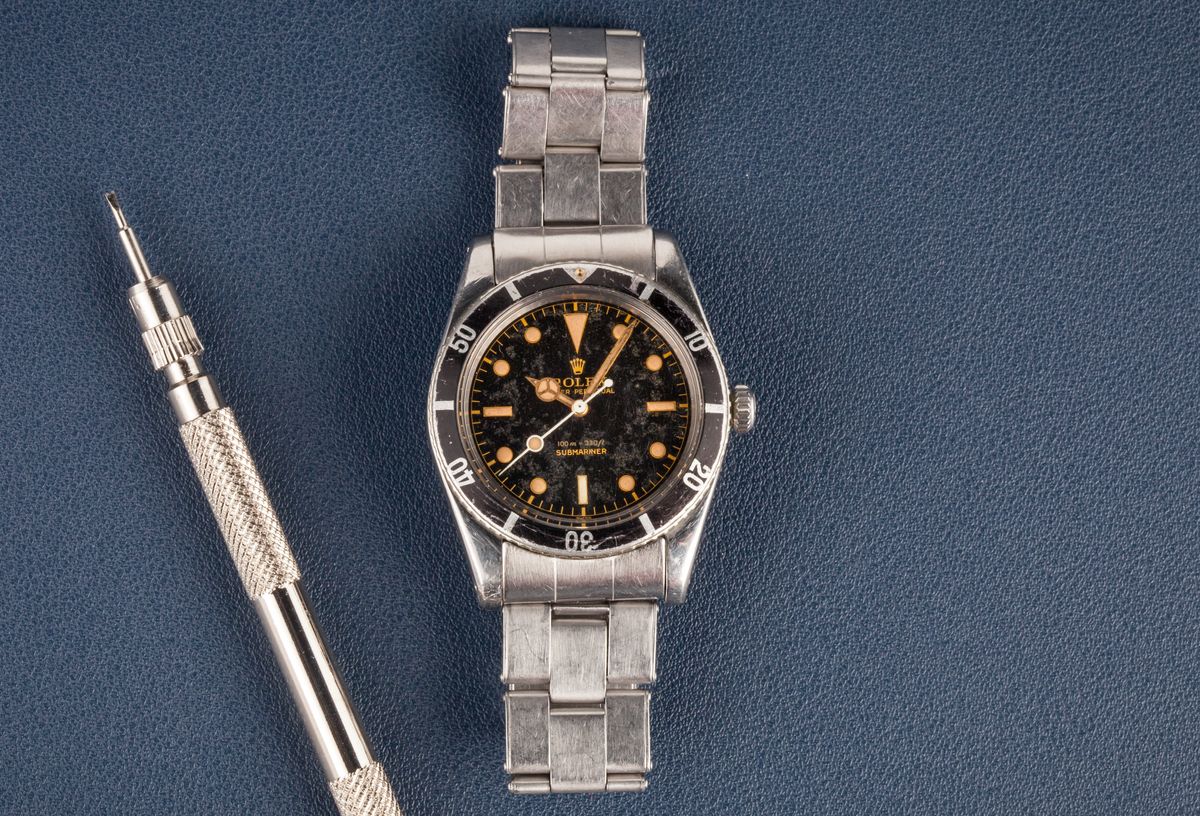
- Production Years (approx): 1958-1962
- Case Diameter: 38mm
- Materials: Stainless Steel
- Dial: Black; Gilt Gloss
- Movement: Cal. 1530 (18,000vph)
- Water Resistance: 100m
The ref. 5508 replaced the ref. 6536, and would become the final pre-crown-guard Submariner model. Its small crown and thinner case brought the water-resistance back down to 100m, and it too was released with the Cal. 1530, in either chronometer or non-chronometer versions. However, the COSC-rated versions of the ref. 5508 saw the first use of Rolex's own 'Superlative Chronometer' text on the dial, as the watch's timekeeping performance was far in excess of the official chronometer standards.
Rolex Submariner ref. 5512 (Estimated Pre-owned Price: $15,000-$80,000)
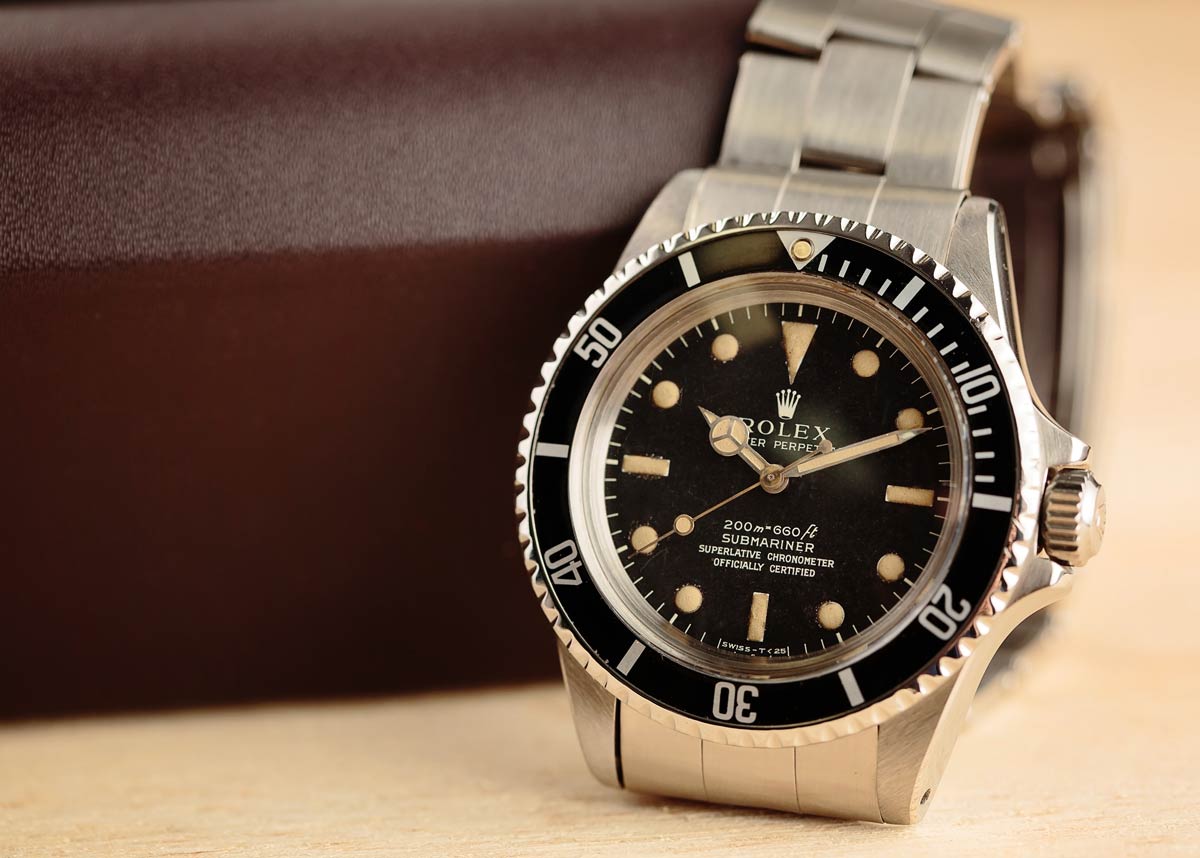
- Production Years (approx): 1959-1980
- Case Diameter: 39.5mm
- Materials: Stainless Steel
- Dial: Black; Gilt Gloss/Matte
- Movement: Cal. 1530/1560/1570 (18,000/19,800vph)
- Water Resistance: 200m
Everything Rolex had learned and poured into the Submariner over its early history culminated in the ref. 5512. This was the first model to be produced for more than just a few years, running all the way from 1959 up to nearly 1980. It also introduced crown guards and had the 40mm size case the Submariner would stick with for more than half a century. Not everything was set in stone just yet though. There are literally dozens of variations of the ref. 5512 in existence, with often minute distinctions between them. To collectors, the tiniest change in dial font or even just a serif here and there constitutes a different version of the watch.
However, there are some more visible alterations too. The crown guards, for instance, went through four styles. The initial type was square but they proved to block the crown too much and made winding difficult. They were very quickly replaced with a sharply tapered form, known as Eagle Beak, which in turn gave way almost immediately to a straighter but still pointed sort until 1963. Finally, the more rounded guards we have today were introduced.
The dial also changed, from the early gilt variety to matte around 1967. Both types have versions with either two or four lines of text, depending on which of the three movements was inside at the time. The first examples of the ref. 5512 were still powered by a non-chronometer-rated Cal. 1530 (giving two-liner dials). That was superseded in 1963 by the COSC-certified Cal. 1560 (so now a four-liner dial), and again by the faster (19,800vph) Cal. 1570 in 1967. If that wasn’t enough, the depth rating could be written with either meters first (200m=660ft) or feet first (660ft=200m). As you can see, the ref. 5512 could (and does) have entire books written about it but the upshot of it all is that the Submariner had found at least a bit of stability at last, and it was proving itself as the last word in dive watches.
Rolex Submariner ref. 5513 (Estimated Pre-owned Price: $10,000-$100,000)
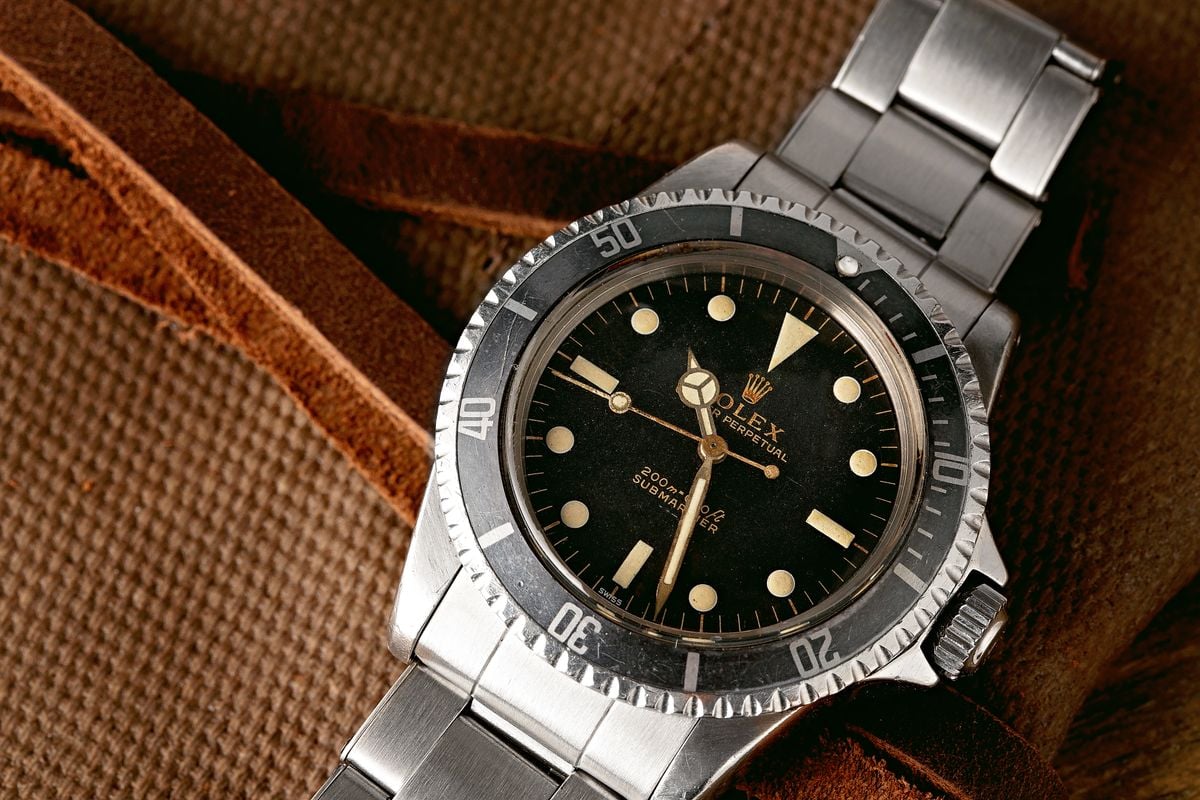
- Production Years (approx): 1962-1989
- Case Diameter: 40mm
- Materials: Stainless Steel
- Dial: Black; Gilt Gloss/Matte
- Movement: Cal. 1530/1520 (18,000/19,800vph)
- Water Resistance: 200m
When the ref. 5512 got its chronometer-rated Cal. 1560, it came with a corresponding increase in price. That meant the stage was set for a watch that was identical in every other respect, but which retained the non-chronometer, and less expensive, Cal. 1530. An incredibly popular addition to the Submariner family, the reference 5513 started life in 1962 and outlasted even its older brother; it was still being made into the late 1980s.
Apart from only ever having two lines of text on its dial below the midpoint (the depth rating and the Submariner name), there is almost nothing to tell it apart from the ref. 5512. It too had plenty of variety, with at least 18 different dial types (including an Explorer dial) and both the pointed and rounded crown guards. It also received something of a downgrade in 1966, when Rolex swapped the Cal. 1530 for the Cal. 1520 in another cost-cutting exercise.
Very similar to the outgoing movement, the Cal. 1520 only had a stick-style regulator rather than the Microstella system of the Cal. 1530, and it went without a Breguet overcoil on its hairspring. It did, however, increase the balance frequency to 19,800vph. Nevertheless, the ref. 5513 was the reference chosen to trial the Sea-Dweller's Helium Escape Valve at the end of the 1960s, and the one to become standard issue to various military forces, which we’ll look at in detail below.
Rolex Submariner ref. 1680 (Estimated Pre-owned Price: $15,000-$100,000)
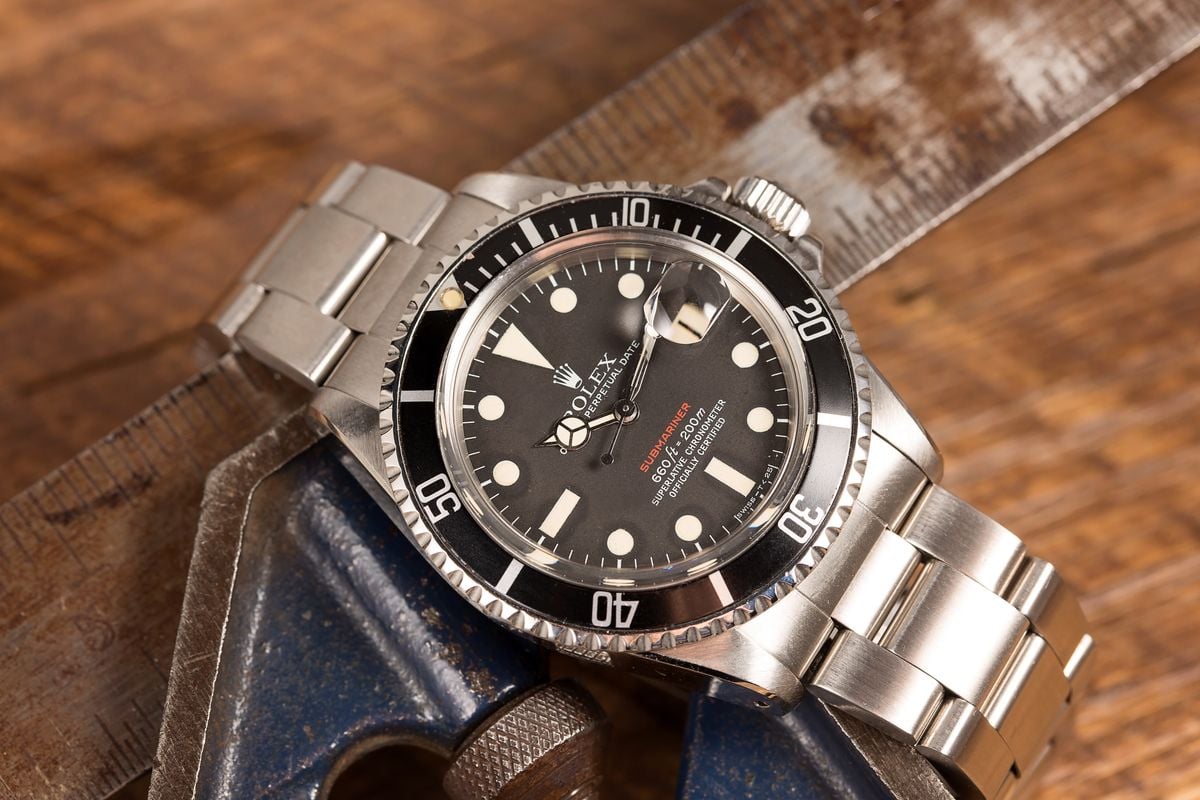
- Production Years (approx): 1969-1979
- Case Diameter: 40mm
- Materials: Stainless Steel or 18k Yellow Gold (ref. 1680/8)
- Dial: Matte Black; blue available on 18k gold version
- Bezel: Black; blue available on 18k gold version
- Movement: Cal. 1575 (19,800vph)
- Water Resistance: 200m
By the time the Submariner got its first date complication in 1969, things had settled down a bit. Consequently (and thankfully) there are fewer variations of the ref. 1680 to wade through, with every model having a matte dial and rounded crown guards. That being said, there are still a few important distinctions to uncover. From its debut until about 1975, the ref. 1680 had its 'Submariner' signature in red in the four lines of dial text. Called, not surprisingly, the "Red Sub" by collectors, it is not to be confused with the Single Red Sea-Dweller. That's the unbelievably rare prototype of that particular diver, with only about 11 still in existence.
The Red Sub gave way in the mid-70s, after seven or eight dial variations (known as 'Marks'), to a replacement with all-white text which took the reference up to the end of its run in 1979. Most importantly, of course, it was the ref. 1680 which brought us the first of the solid gold Submariners. The 18k model with the black dial and bezel went through the same years as the steel version, 1969-1979. The blue dial and bezel model started a little while later in 1971. Both were given 'nipple dials' where the indexes are raised, with a dot of lume in the middle.
And so the Submariner collection split. The no-date Subs carried on as they were with the ref. 5513 for another 10-years, while the date versions received far more attention and updates from Rolex. To this day there has still never been a no-date Sub in anything other than steel, further marking it as the purist’s watch, as opposed to its more aspirational, date-displaying sibling.
Rolex Submariner ref. 16800 (Estimated Pre-owned Price: $8,000-$25,000)
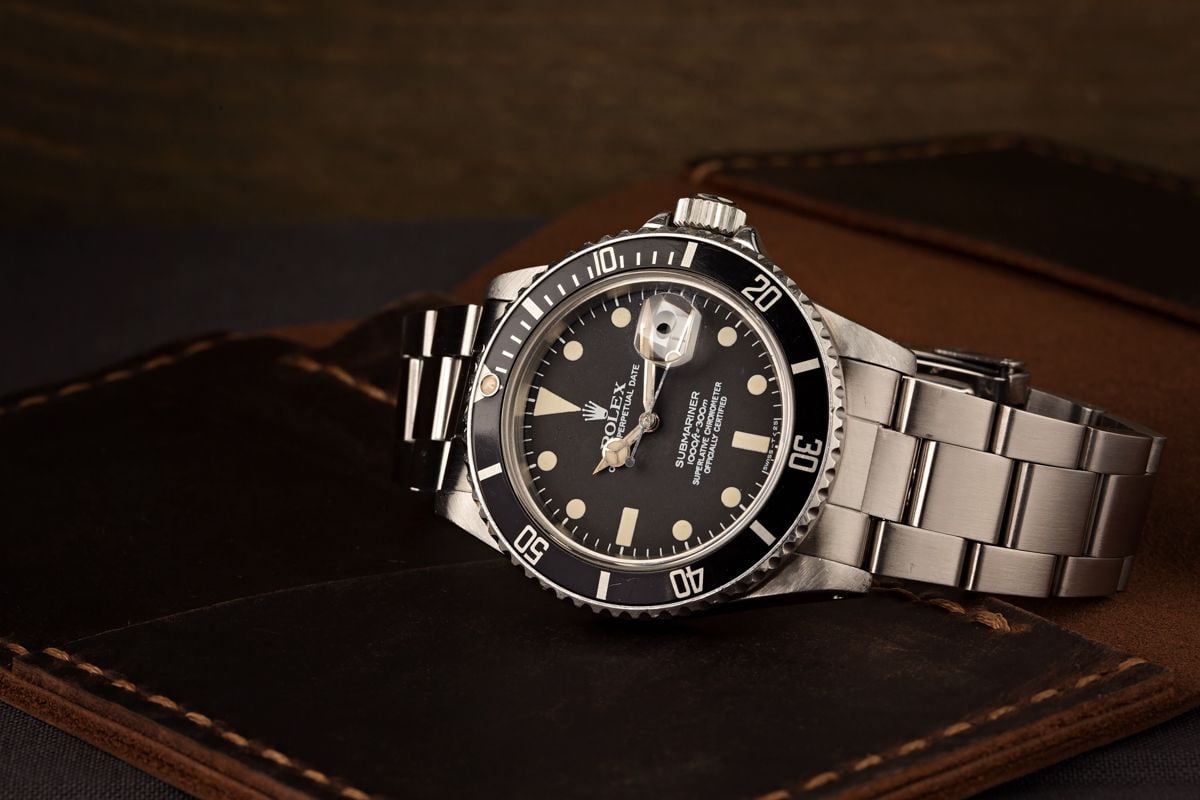
- Production Years (approx): 1979-1988
- Case Diameter: 40mm
- Materials: Stainless Steel; 18k Yellow Gold (ref. 16808); Rolesor (ref. 16803)
- Dial: Black. Matte/Gloss; blue and Serti available on gold and Rolesor versions
- Bezel: Black; blue available on gold and Rolesor versions
- Movement: Cal. 3035 (28,800vph)
- Water Resistance: 300m
The ref. 16800 tends to get overlooked in Submariner fandom, but it is undoubtedly an important reference in the watch's story. Seen as a transitional model, in that it presented new features while retaining plenty of key traits from its forerunners, it was the first Sub to have a high beat caliber, the Cal. 3035, working away at the now-Rolex standard 28,800vph and introducing a Quickset function.
It was also the first to have a sapphire crystal, the first to be waterproof to 300m, and the last to have a matte dial. In fact, some very late run ref. 16800s were presented with glossy dials and hour markers ringed in white gold. Finally, it was the reference to bring the Serti dial to the Submariner range. Taking their name from the French word 'sertissage' (meaning 'gem-setting'), these opulent dials have sapphires at the 6, 9, and 12 o'clock, and a further eight diamonds for the other indexes, with only the 3 o'clock left un-gemmed to leave room for the date window.
Rolex Submariner ref. 168000 (Estimated Pre-owned Price: $9,000-$15,000)
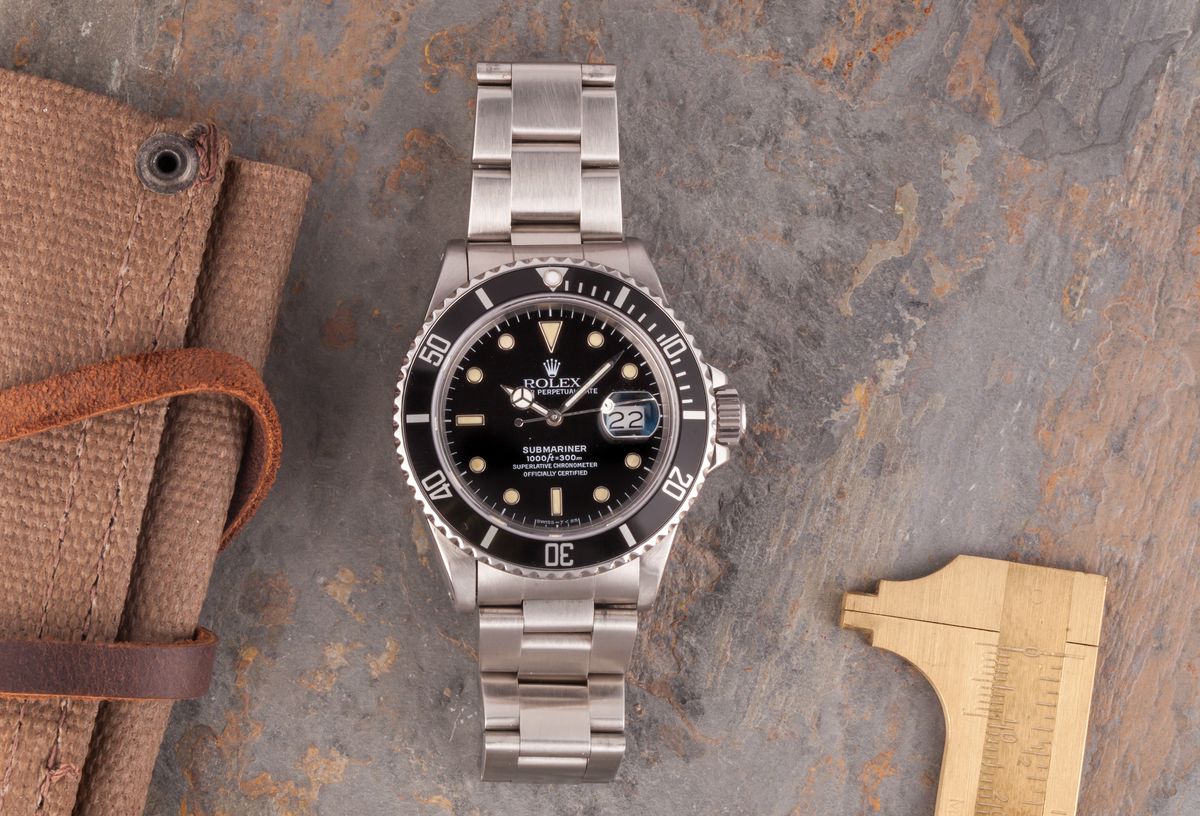
- Production Years (approx): 1988-1989
- Case Diameter: 40mm
- Materials: Stainless Steel
- Dial: Black; Gloss
- Bezel: Black
- Movement: Cal. 3035 (28,800vph)
- Water Resistance: 300m
Known colloquially as the Triple Zero, the ref. 168000 ran from mid-1988 to mid-1989 and was an exact replica of the ref. 16800 in every respect except for its metal. This was the first reference to be forged from 904L steel, replacing the former 316L of the range up to that point. Although an extremely hardwearing alloy, Rolex had noticed their 316L cast watches, and especially their divers, were slightly susceptible to corrosion from chloride and saltwater. The case backs in particular showed signs of rusting and pitting around the screw threads.
The makeup of 904L, usually the preserve of the aerospace and chemical industries, contained higher amounts of chromium, molybdenum, nickel, and copper. It didn’t make the metal that much harder but did ensure it was more resistant to any kind of deterioration. It also had an extra bonus. When polished, 904L steel has a distinctive luster, which not only sets Rolex’s watches apart in a crowded marketplace but also makes them more difficult to fake. However, the material is notoriously difficult to work with, requiring a complete retooling of the brand’s manufacturing plant at enormous expense, with those costs eventually passed on to the consumer.
Rolex Submariner ref. 16610 (Estimated Pre-owned Price: $8,000-$35,000)
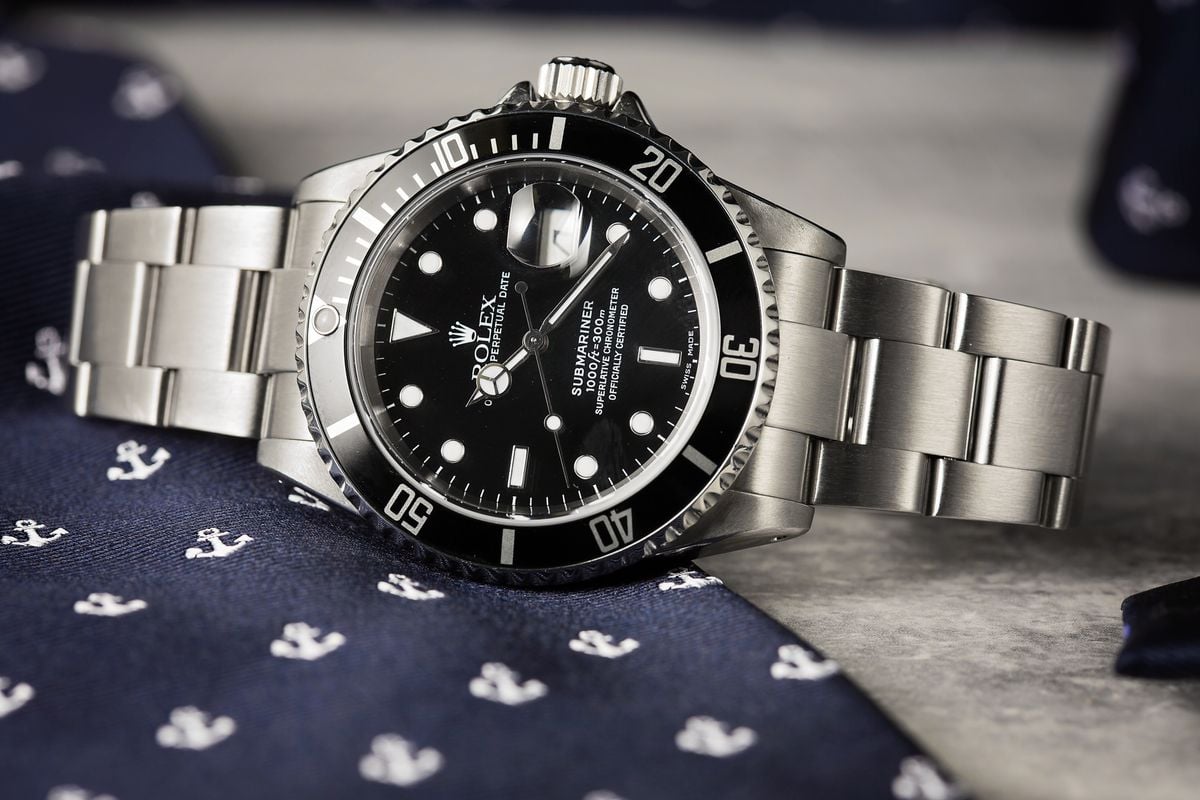
- Production Years (approx): 1989-2010
- Case Diameter: 40mm
- Materials: Stainless Steel; 18k Yellow Gold (ref. 16618); Rolesor (ref. 16613)
- Dial: Black Gloss; blue and Serti available on gold and Rolesor versions
- Bezel: Black; blue available on gold and Rolesor versions; green available on 50th Anniversary model
- Movement: Cal. 3135 (28,800vph)
- Water Resistance: 300m
As you can see, even four decades after its introduction, Rolex was still frequently updating the Sub. But with the 1989 release of the ref. 16610 they were clearly happy enough to leave it alone, at least for a while. It stayed in production for about 20 years and is sometimes referred to as the 'last of the best' by fans of the vintage style watches.
What they mean is that it is the last Submariner to have both an aluminum bezel insert and a non-Super Case. That's not to say the ref. 16610 was behind the times. In fact, it received multiple updates during its run. The luminescence, for example, changed four times. Until 1998, Rolex was still using Tritium - far safer than the radium of the very first Sub references, but still radioactive nonetheless. Between 1998 and 2000, they switched to Luminova, a photoluminescent paint that was completely harmless. Then, from 2000 to 2008 they used SuperLuminova, basically the same stuff but made by a Swiss company. And finally, from 2008 to the present day, Rolex's own Chromalight, which glows blue rather than green.
The easiest way to check which type a particular ref. 16610 has (and therefore roughly which year it was made) is to check the dial marking at the very bottom, beneath the six o’clock index. There you will see either:
- 'T Swiss T' or 'Swiss T<25' for tritium
- 'SWISS' for Luminova
- 'SWISS MADE' for SuperLuminova
- 'SWISS MADE' for Chromalight (but the hands and indexes will be blue)
Also, in an attempt to foil counterfeiters, the brand started etching a tiny laser crown on the crystal and engraving ROLEX ROLEX ROLEX along with the serial number on the rehaut (the inner bezel ring surrounding the dial) around 2007. On top of that, cases with lug holes were phased out from 2003 onwards, and the bracelets were reworked. They now had all solid links, including end links, and were given the Easylink system, allowing for 5mm of extension without tools.
However, the biggest change from the last generation was the movement. The Cal. 3135 is something of a modern-day legend, one of the longest-serving and most widely used calibers Rolex has ever made. A big, simple, no-nonsense workhorse, it proved to be extremely reliable and highly accurate and would keep on working no matter what.
In 2000, it was given the Parachrom hairspring Rolex had been developing for five years, and in 2005, the brand thickened the spring's oxide layer, causing it to turn blue when it reacted with the air, leading to its blue Parachrom name. The precious metal versions of the model, the ref. 16613 (Rolesor) and ref. 16618 (18k yellow gold) continued to be as popular as ever, although they no longer had nipple dials. This would also be the last generation with a Serti dial option. The green bezel ref. 16610LV (for Lunette Verte) came out in 2003 to commemorate 50-years at the top of the dive watch food chain. After some initial resistance, the Kermit became, and still remains, a much sought after Submariner variant.
A quick note about the no-date Subs: In 1990, the ref. 5513 was finally retired and replaced by the ref. 14060. Essentially exactly the same watch as the steel ref. 16610 bar the calendar function, it was driven by the Cal. 3000. It was, in turn, surpassed in 2002 with the ref. 14060M (standing for Modified). This gained the Cal. 3130, again the same caliber as in the ref. 16610 but without the date module. However, it wouldn’t be until 2007 that the ref. 14060M became an official chronometer. That took the model up to the next generation in 2012.
Rolex Submariner ref. 116610 (Estimated Pre-owned Price: $10,000-$40,000)
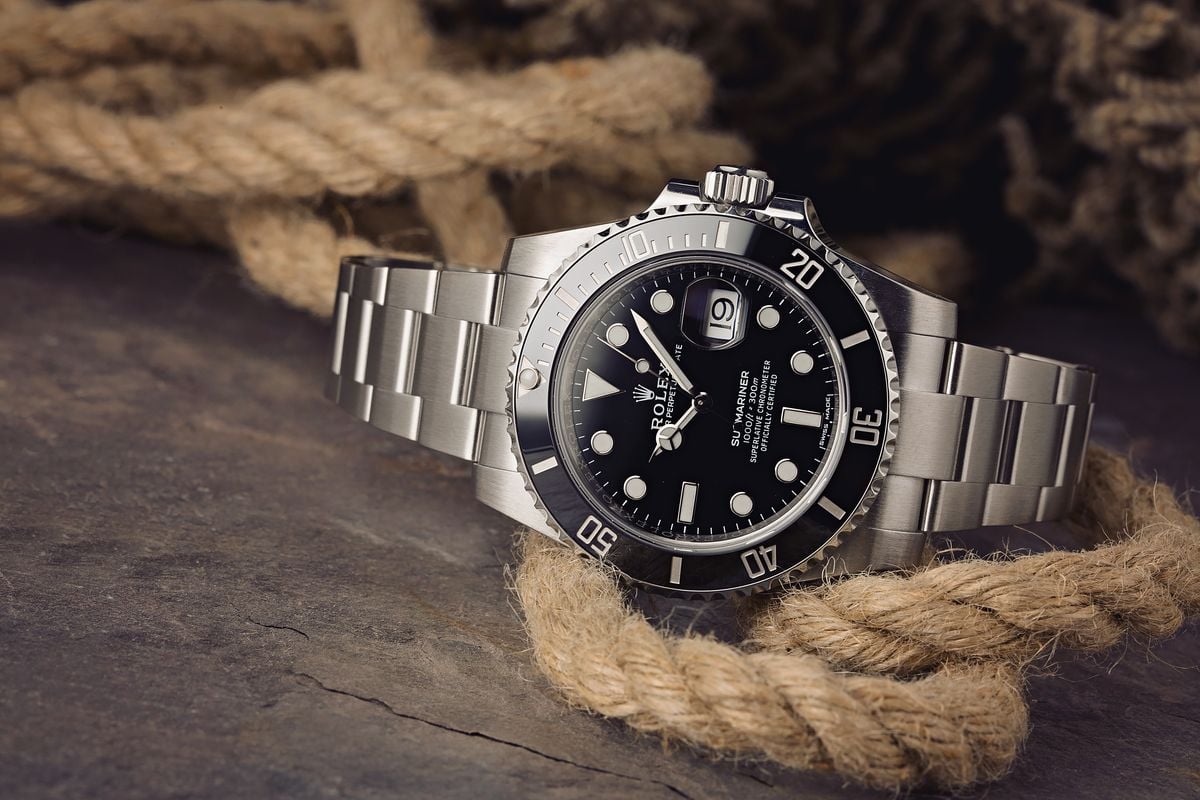
- Production Years (approx): 2010-2020
- Case Diameter: 40mm Super Case
- Materials: Stainless Steel; 18k Yellow Gold (ref. 116618); Rolesor (ref. 116613); White Gold (ref. 116619)
- Dial: Black Gloss; blue and Serti available on gold and Rolesor versions; green available on ref. 116610LV
- Bezel: Black Cerachrom; blue available on gold and Rolesor versions; green available on ref. 116610LV
- Movement: Cal. 3135 (28,800vph)
- Water Resistance: 300m
Just as with the arrival of the date function in 1969, the appearance of the Super Case with the first of the six-digit Subs was another controversial Rolex move. It was obviously done to try and appease fans who clamored for a bigger watch, and its thicker lugs and guards certainly made for a more imposing stance, but it was both welcomed in some quarters and roundly criticized in others.
The Cerachrom ceramic bezel was another bone of contention. Although its properties were certainly impressive—massively resistant to fading and scratching—many horology fans love a bit of character in their watches and this new generation promised to look brand new and spotless forever. Nevertheless, the Submariner by this time was practically untouchable and nothing was going to affect its reputation.
The Kermit replacement, the ref. 116610LV, with its green dial to match its bezel, became one of the most desirable of all and was gifted the nickname the Hulk. Similarly, a white gold piece in all blue (known as the Smurf) was another lusted-after, though far more expensive example. The Cal. 3135 still ticked away inside, a testament to just how good it was even after 30-years. However, the first rumblings of an update were heard, particularly with the Sea-Dweller being given one of the new-generation movements that were just starting to work their way through Rolex's catalog.
Rolex Submariner ref. 126610 (Estimated Pre-owned Price: $8,100-$50,000)
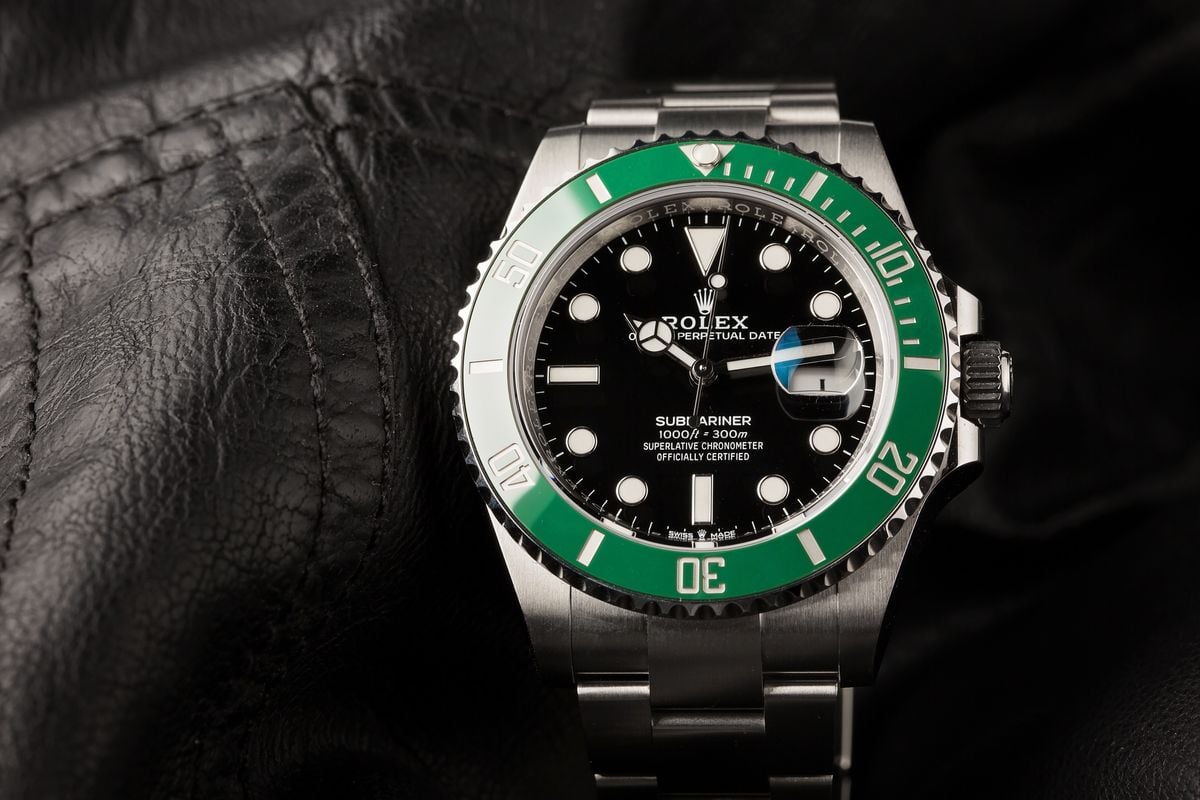
- Production Years (approx): 2020-Present
- Case Diameter: 41mm
- Materials: Stainless Steel; 18k Yellow Gold (ref. 126618); Rolesor (ref. 126613); White Gold (ref. 126619)
- Dial: Black Gloss; blue available on gold and Rolesor versions
- Bezel: Black Cerachrom; blue available on gold and Rolesor versions; green available on ref. 126610LV
- Movement: Cal. 3235 (28,800vph)
- Water Resistance: 300m
For the first time in its history, 2020 saw the Sub grow beyond its self-imposed 40mm limits. However, while the new 41mm case represents an increase in size, the proportions of the most influential elements, the crown guards and the lugs, have been reshaped to give an overall slimmer, more svelte appearance. Basically, the Submariner has reverted to back to an earlier aesthetic, one which still saw it as a tough, robust performer but with a little more vintage elegance.
Inside, at long last, is the Cal. 3235, the very latest movement to come out of Rolex’s industry-leading manufacture. Almost a top to bottom redesign of the Cal. 3135, it brings the Chronergy escapement and a 70-hour power reserve and is about as good as it is possible to get in a mass-produced caliber today. The range consists of eight versions. The Hulk is gone and has been replaced by a new Kermit with a green bezel and black dial (more evidence of Rolex going backward to go forwards). Likewise, the Smurf now has just a blue bezel, while the rest of the series is as it has been for a while; a mix of yellow gold and Rolesor with either blue or black detailing.
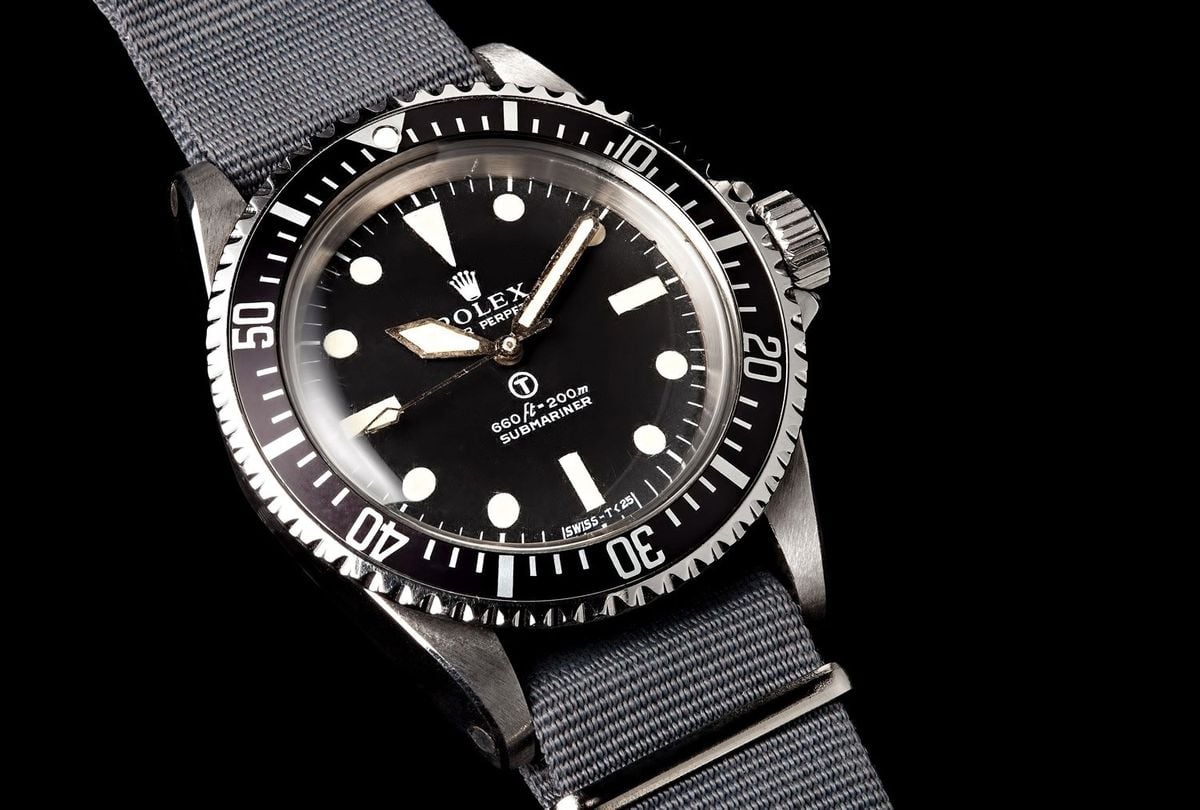
The Rolex Submariner Special References
Within that mass of commercially released references, there have been several versions of the Submariner especially commissioned or modified for various professional outfits and never publically sold.
The MilSubs
Identifying a MilSub
First off, it is pretty unlikely you will just happen across a MilSub by accident. There are, for instance, about 12 of the A/6538s still in existence. And of the 1,200 watches sent out in the 1970s, only around 180 have survived. However, they are still out there somewhere, and they do have some distinguishing features. Most, although not all, will have a small letter 'T' in a circle on the dial, signifying that the lume is tritium rather than the radium the ref. 6538 was still using in the 50s.
The handset on the ref. 5513 variants may also be different, with 'Gladiator' or 'Sword' hands replacing the usual Mercedes style. And the hash marks on the bezel might continue all the way around instead of just for the first 15-minutes. Of the five, it is the ref. 5517 which has become the most desirable. The reference with no civilian equivalent, all examples of these have the sword hands and full hash marks, along with an engraved case back; W-10 for the Army, 0552 for the Navy.
However, a word of caution. Because of how easy it is to take an everyday ref. 5513 and make it look like a MilSub while adding zeroes onto the end of the asking price, buying one isn’t something to be entered into lightly. Huge amounts of research and expert help are very much advised before parting with any money.
The Submariner Ref. 5514
Just about the only version of the Sub which can match the ref. 5517 for collector appeal is the ref. 5514. When French deep-sea diving specialists COMEX experienced the problem of helium bubbles seeping inside the cases of their watches during long saturation dives, then expanding and blowing the crystals off during ascent, they turned to Rolex for help.
Together with fellow Swiss manufacturer Doxa, the two brands came up with the Helium Escape Valve. A spring-loaded, one-way regulator set into the watch case at 9 o'clock, it would open when the pressure inside became greater than the ambient pressure, allowing the helium to bleed out gradually. Retrofitting the HEV to the ref. 5513 and sending it off for testing, the results came back successful and COMEX commissioned a number of specially made watches for their crew and the ref. 5514 is the result.
Three separate, very low number batches were sent to the diving outfit up until the end of the 1970s and only about 150 or so are thought to still be in circulation. As with the ref. 5517 MilSub above, there is much to be cautious about with the ref. 5514. Counterfeits abound and some significant homework is needed on the various telltale signs before making a purchase. 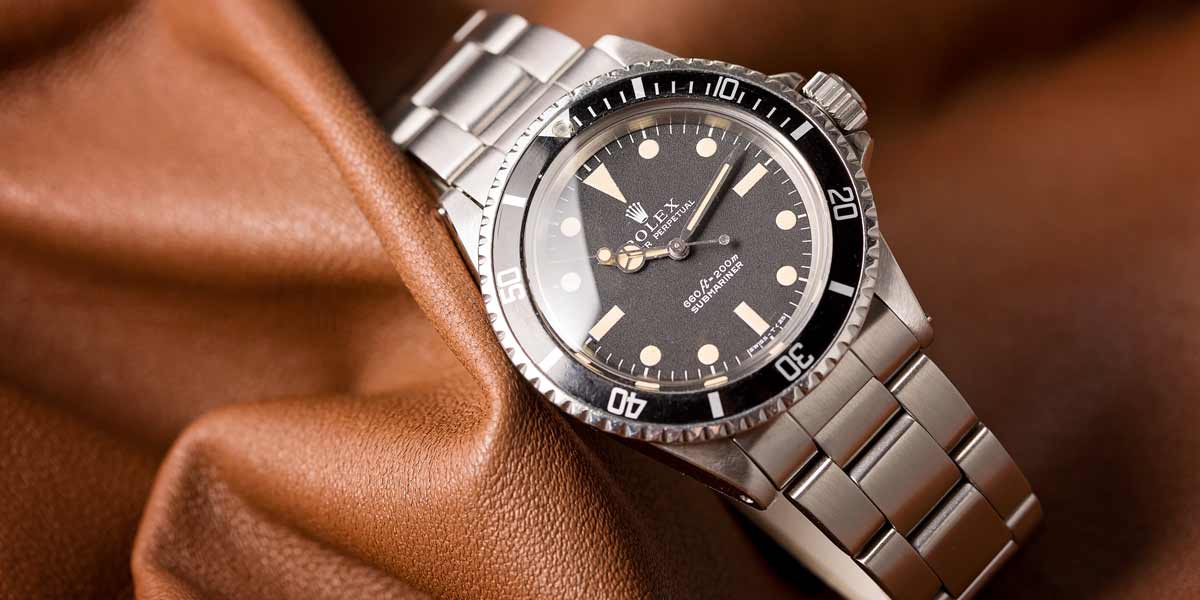
The Rolex Submariner: Famous Wearers
If the old adage about being able to judge someone by the company they keep is true, the Submariner has nothing to worry about. The list of famous people who have worn the watch reads like a who's who of the great and the good.
Starting right back at the beginning, we can choose Jacques Cousteau, the man responsible, at least in part, for its creation. He sported an early prototype during his Oscar award-winning movie The Silent World. From there we can look at some Hollywood Golden Age royalty, with the likes of Burt Lancaster and Robert Redford both being fans. Out-cooling them, and everyone else is Steve McQueen. His name might be attached (erroneously) to the first of the Explorer II references, the ref. 1655, but the watch he actually wore was the Sub ref. 5512.
In the modern era, comedian and musician Jack Black is often spotted wearing a white gold Smurf, actor Mark Wahlberg has an extensive Rolex collection, including a yellow gold ref. 116618LB and Slash from Guns N' Roses can frequently be seen spotted wearing the ref. 116610LV Hulk.
Bond Submariner, James Bond Submariner
Of course, the Sub's most illustrious devotee, and just about the best advertisement any product ever had, fictional or not, is James Bond. In total, four 007s have worn the Submariner, in eight films. We've already looked at the original, the ref. 6538 Big Crown that Sean Connery wore in the first Bond outing, Dr. No. But it actually cropped up again in the next three movies as well; From Russia With Love, Goldfinger and Thunderball. Those were the only Connery missions with the Sub, but one-hit-wonder George Lazenby got to wear three Rolexes during his brief tenure - the ref. 6538 and ref. 5513 Subs, as well as a beautiful pre-Daytona, the ref. 6238 all appeared in On Her Majesty's Secret Service.
When Roger Moore took over in 1973's Live and Let Die, his ref. 5513 was fresh from Q's workshop and fitted with both a circular saw bezel and a powerful electromagnet. Although they proved successful for getting himself out of handcuffs and lady friends out of dresses, by his next mission, The Man With the Golden Gun, Bond was back to a standard-issue ref. 1680.
Rolex's final contribution to a Bond film before the producers switched allegiance to Omega was in 1989's Licence to Kill, with Timothy Dalton. In it, Dalton himself wears the Submariner ref. 16610 while, if you look very hard and are a real watch nerd, you will spot his stunt double with a no-date ref. 5513. But don’t let it spoil the rest of the movie for you. 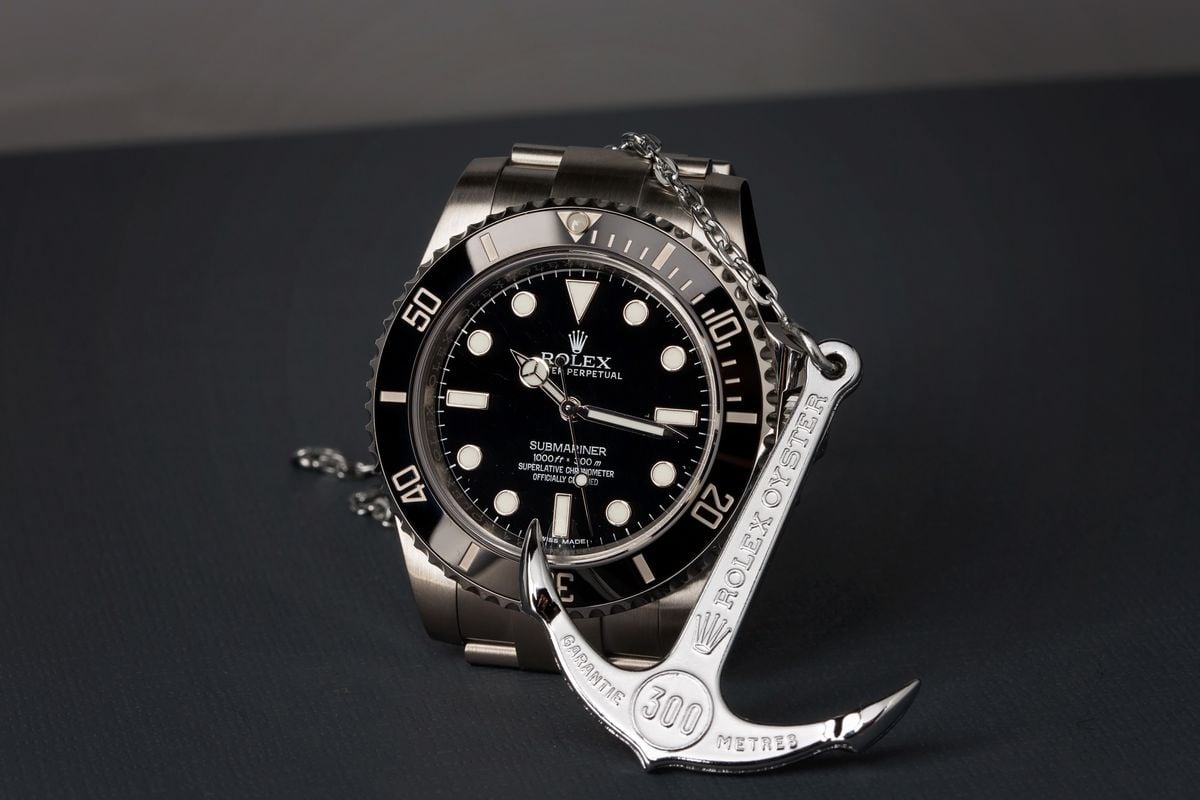
A Timeless Classic
So there we have our guide to the world's most adored sports watch, the Rolex Submariner. As a piece of design, there is little to rival it - perfectly simple, purely functional, and effortlessly sophisticated. Evidence of just how successful it has been can be found in the minimal styling changes made in the last 50-years.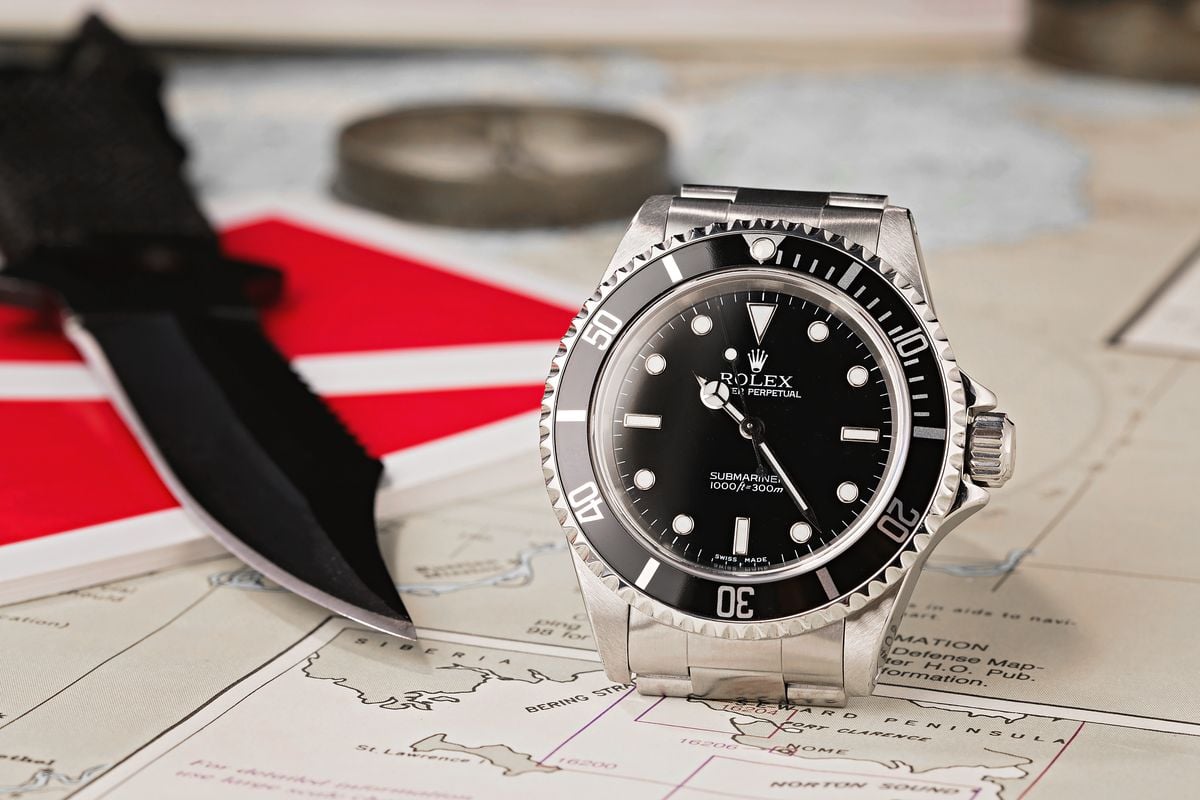
In many ways, the Rolex Submariner can be likened to the Porsche 911. Take a brand new showroom model now and park it next to its originator from many decades ago, and you will see several generations of continuous progress and refinement. However; at its core, it still very much remains the same car.
The Submariner has matured in the same way. Only the subtlest, most necessary visual alterations have happened, with the essential blueprint remaining unaffected. Looking at our charts above, you can see there is a Sub at almost every price point. Around $8,000 is enough to get you in the door with a vital piece of Rolex, and horology, history. And that is a good thing because there is no collection that can be called complete without at least one Rolex Submariner.

One thing that creates the fission of popularity for various Rolex watch models has always been the celebrities or noted people who choose to wear them. The Rolex Submariner certainly stands out in that category, having been featured in eleven James Bond movies and worn by Bonds including Roger Moore, Timothy Dalton and even Sean Connery.
Back in the real world, the Rolex Submariner got a workout on the wrist of Norwegian anthropologist Thor Heyerdal during his Ra II 1970 expedition and withstood more than 1,000 dives during his Moana sea expedition. During this time, the Submariner proved its true worth, withstanding temperatures of 45 degrees below zero Centigrade. This led to the French diving company COMEX choosing the Submariner as its standard issue for saturation divers as well as the British Royal Navy making it the choice for its frogmen.
The Real Deal: Features of the Rolex Submariner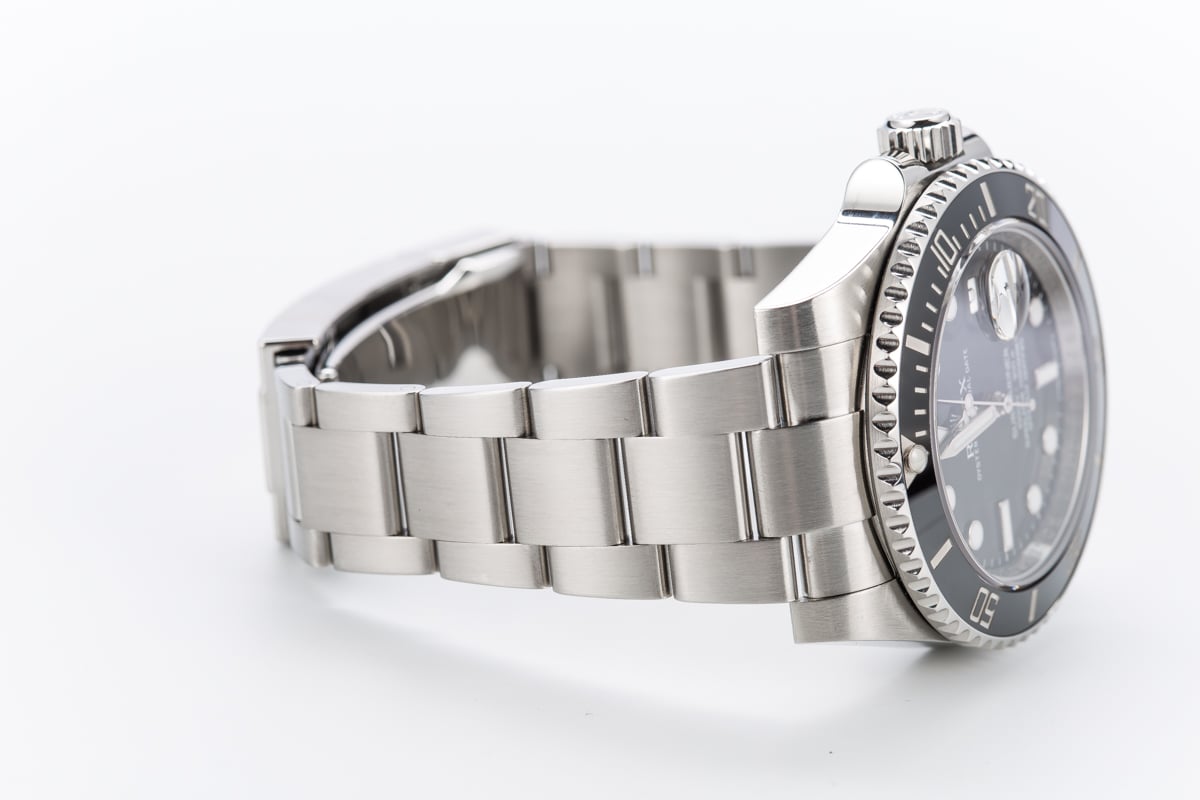
The Submariner has changed its looks over the years, so it pays to know the features of various time periods when you are shopping for one of these vintage watches. Today's Submariner features the "cathedral" or "Mercedes" hands with the characteristic rounded piece near the point of the hand. Early models in the 1950s featured the "pencil" hands that were much smaller and plainer. The newer models also feature the name "Submariner" on the dial and have two options for the winding crown, a small and an oversized piece.
One of the most important features of the Submariner is the unidirectional bezel that allows divers to track immersion time. The bezel rotates in a counterclockwise manner so that time is always "made shorter." A diver can easily keep track of the amount of time underwater with this feature.
The Submariner is part of the Oyster Perpetual line of self-winding watches. A perpetual rotor operates when the watch is moved even slightly and continues to keep time for up to three days.
The Submariner comes in three forms: stainless steel, two-tone and gold. The stainless are the least expensive watches while the gold are the most expensive, with two-tone falling in between.
Stainless Steel Models
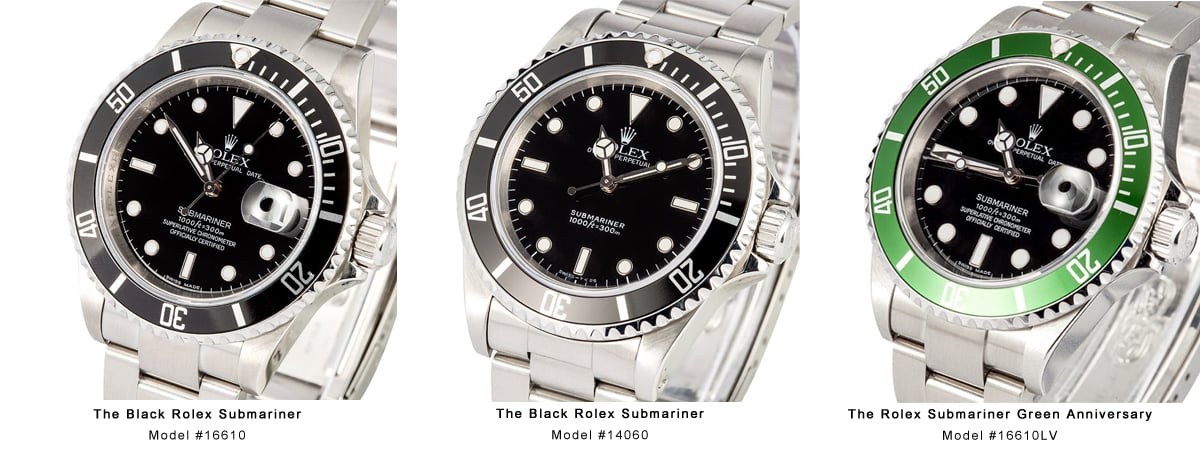
The Black Rolex Submariner Model #16610. This watch is an excellent choice for an entry-level Rolex. Its simple, clean lines and sharp back face with luminescent hands make it a great timepiece for almost any wear. The stainless steel bracelet and case are striking, and the price of this watch usually ranges from $10,495 to $18,995, depending on the age and condition. The 16610 was produced from 1989 to 2010.
The Black Rolex Submariner Model #14060. Practically a clone of the 16610, the 14060 has no date, making it the watch of choice for serious collectors. Many enthusiasts prefer the no date functions as they believe them to be more visually balanced. There are fewer of these watches, which were produced from 1990 to 2002, than of other models, making them slightly higher in price $10,995 to $11,795.
The Rolex Submariner Green Anniversary Model #16610LV. This watch features a variety of sleek engineering tricks such as automatic winding and luminous markers. This stainless steel oyster with 31 jewels and quickset was produced between 2003 and 2010 to commemorate the 50th anniversary of the Submariner. Today, this lovely collectible watch can be found for about $16,995..
The Rolex Submariner Green Dial Model #116610LV. Like the 16610LV, this watch was designed to commemorate the 50th anniversary of the Submariner. Known as the “Rolex green Submariner,” this watch, which is currently in production by Rolex, features a green bezel and Maxi dial. This model has become something of a rage among collectors and currently sells for about $19,995 on the secondary market.
The Rolex Submariner Ceramic Bezel Model #116610. This model is currently in production by Rolex and features a waterproof 40mm stainless steel case, a signature screw down crown and a handsome black dial. The dial features white LumiNova hour markers for a striking appearance. The current pre-owned prices for this watch start at about $10,495.
Two-Tone Models (18k and Steel)
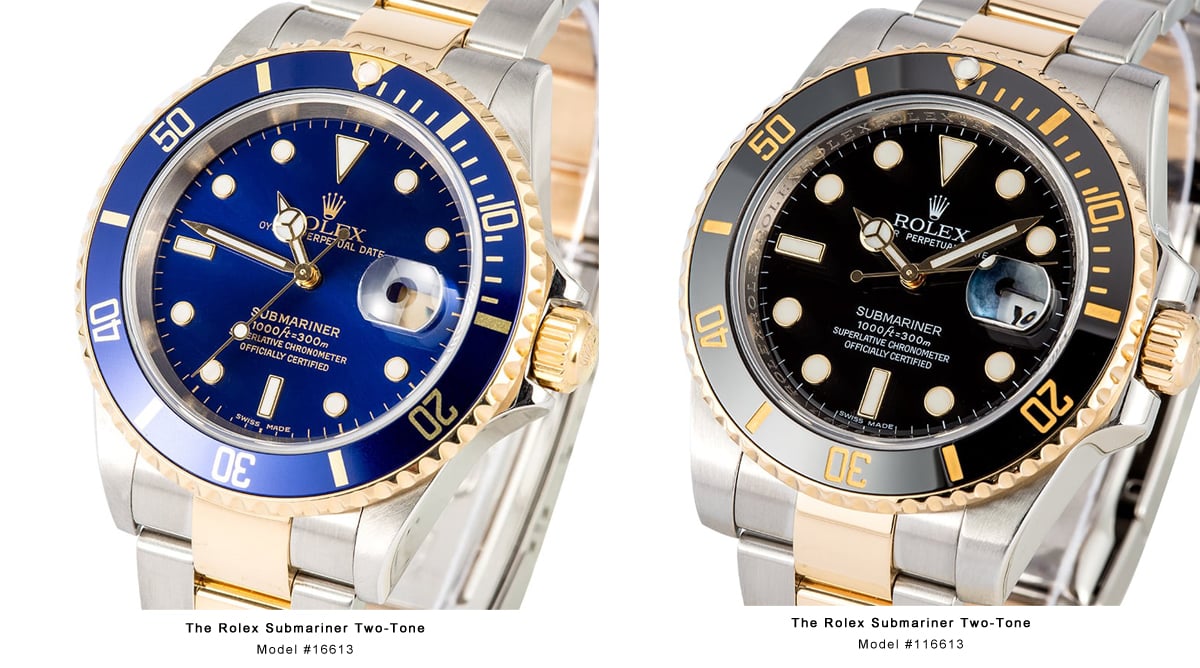
The Rolex Submariner Two-Tone Model #16613. This beautiful two-tone watch features an easy rotating ceramic diver’s bezel, true to the watch's original purpose. It also features a 31-jewel movement and self-winding technology, making it a truly worry-free and useful timepiece. With a sapphire crystal this watch comes with a number of dial and bracelet options. Buyers can search for a dial in black, silver, and blue as well as luminous hour markers. This model was produced from about 1988 to 2010. These watches can be found on the resale market today for between $11,795 to $17,995, depending on age and condition.
The Rolex Submariner Two-Tone Model #116613. This lovely watch has a brilliant blue face with luminous hands and markers. The handsome bracelet is made with 18-karat yellow gold mixed with steel for an interesting look. The ceramic bezel two-tone Submariner can cost as little as $14,595 to as much as $15,795 on the used market.
Solid 18k Gold Models
The Rolex 18K Gold Submariner Model #16618. This watch was designed in 1990 and it has remained one of the most valuable of all Rolex watches to this day. Featuring a solid 18-karat gold oyster bracelet as well as a rotating diver bezel and white markets with a screw-down crown, this watch is truly a fashion statement as well as a strong timekeeper. A good pre-owned 18K gold Submariner will cost around $35,495. These models were produced between 1990 and 2010.
The Rolex 18K Gold Submariner Model #116618. Designed in 2007, this watch is the king of Rolex Submariners. The black dial with white, luminous hour markers, the Oyster bracelet made from 18-karat yellow gold with Glidelock clasps and the other lovely features make this a classic that is still in production. Plan to spend between $34,500 and $39,000 for this model.
The Rolex White Gold Submariner Model #116619. Think of the 116618, but in white gold. This watch, which has a starting price of about $37,995, is pressure proof up to 1,000 feet and is currently in production.
The Best Watch For Your Money - You Decide
Its fame, even now, nearly 70-years after its debut, is truly unparalleled. More often than not the first port of call for every aspiring Rolex collector, the Submariner also holds the dubious distinction of being the most counterfeited watch in the world. There are reportedly more fake Rolex Submariner watches in circulation than the real thing. Like all true greats of industrial design, the Sub’s strength lies in its simplicity. The basic aesthetics have a minimalist, form-following-function quality, created to do their job first and everything else second. The Rolex Submariner was conceived and built to be easily readable, deep underwater. The fact that the resulting watch was also stylish and versatile enough to be worn with just about anything; from t-shirt and jeans through to a tuxedo, was both the icing on the cake and the reason its basic appearance has barely altered for decades. Rolex just got it right the first time.
That's not to say there haven't been some changes over the years; in fact, there have actually been plenty. Materials have improved, precious metal versions have been launched, complications (a date display) added, different colors introduced, and movements upgraded. However, despite all of the updates, the essential substance of the watch has been retained - it may rarely get used for its original purpose of diving these days, but it is still a pop culture icon and quite possibly the most important sports watch ever made.
The Submariner is also among the most well documented. There is, with every pun intended, an ocean of Rolex Submariner information out there, which can make choosing the perfect model for you an overwhelming task. That's why we have put together this extensive buying guide, with all the most pertinent material gathered together in one place, and we hope it will become an invaluable reference manual for you as you begin your search. There's a lot to get through, but in the end we feel it is an iconic timepeice worth the investment.